The Magazine of King School



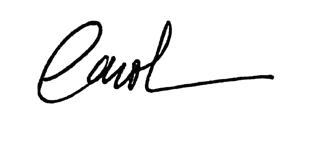

Over the years, one of the most admirable aspects of King School has been its ability to evolve to deliver an unparalleled and relevant educational experience for its students. At the same time, King remains connected to its roots; the guiding principles of our founding schools ring as true today as they did in the past.

During my time at King, I have immersed myself in our mission, embraced our virtues, and never lost sight of our Strategic Plan. All of those components of the King School identity are fascinatingly intertwined with what mattered most to our founding schools. To me, this is one of the most powerful and enriching features of our history.
King School’s long-lasting commitment to excellence in academics and shaping well-rounded students continues to be central to our students’ experience. Our predecessor schools emphasized the importance of community and responsible citizenship.
As we continue King’s most recent chapter, my colleagues on the leadership team and I felt it was appropriate to make the theme for this year, Growing Together, a perfect sequel to last year’s theme, Committing to Community, and a testament to our evolution as a school since our founding.
In addition to growing together as a community where every member enjoys a strong sense of belonging, we are growing together as an academic institution that is committed to achieving excellence and distinguishing itself as a research-focused school that applies an inquiry-based pedagogy in every grade and every subject area.
We made this goal a strategic priority because we know that through an inquirybased approach to teaching and learning, students become more engaged and therefore achieve deeper and long-lasting knowledge.
In this issue of Quest, you will see myriad examples of our inquiry-based methodology and our students embracing and unleashing the power of wonder. You will also find a recap of our annual traditions and activities highlighting the power of our community, its generosity, and the power of belonging — in other words, the power of a King School education.
King School is dedicated to preparing its students to thrive in a rapidly changing world.
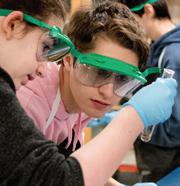
We provide an excellent, progressive education, grounded in the traditional disciplines of the arts and sciences, committed to the nurturing of individual potential, and designed to promote critical thinking and reasoned reflection. Using rich and innovative methods, our teachers facilitate each student’s fullest academic and personal achievement. We champion the development of character, self-confidence, and talent through challenging intellectual, creative, athletic, leadership, and service opportunities.
King believes that individual accomplishment must go hand in hand with respect for others. Our culture of respect fosters collaboration as well as independence. We embrace human and cultural diversity. We value responsible citizenship.
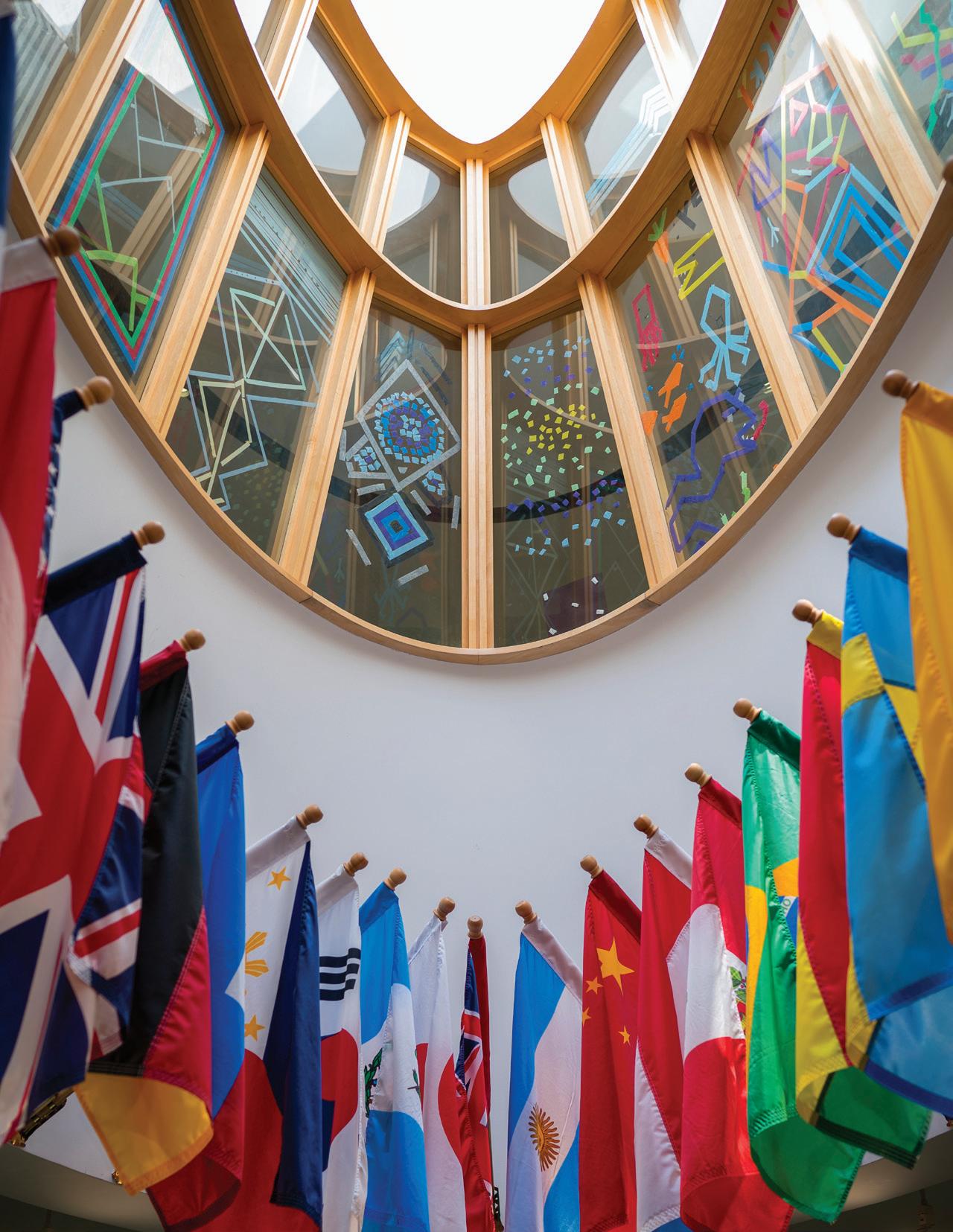
King graduates are well equipped to succeed in college and to pursue lives of ongoing inquiry, learning, accomplishment, personal fulfillment, and social responsibility.
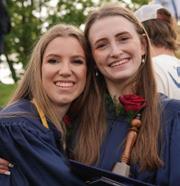
How Wonder Drives Learning 6 Science

An Endangered Frog Finds Hope in an Upper School Lab 10 Performing Arts
Self-Discovery in the Spotlight 14 Art and Design Art as a Medium for Personal Growth 16
Athletics
An Academic Approach Delivers a Competitive Edge 18 Inquiry in Action
Elevating Learning Through Research and Inquiry 20
Charlie Keating ’17
Cultivating Curiosity Builds a Career Path 24
Jesse Freedman ’00 Creating Magic Through Discipline and Self-Discovery 26
Clare Nichols Drebitko ’92
Caring for Community: Discovering a Life of Purpose 28
Ruthie Hubbard ’08 Connecting the Dots to Make an Impact 30
Rob Kligman ’92
Being Adaptable: The Confidence to Take a Chance 32
THE POWER OF COMMUNITY
Commencement 2022 . . . 34
Meet Barb Drayer Director of Development 38
King Gala 2022 . . . 40
Community Events . . . 42

The King community is grateful to our faculty and staff for their leadership and for their commitment to the school’s mission. Thank you for embodying our virtues and for helping our students reach their full academic and personal potential.


As part of an investigation conducted by lower school students last fall, a unit of Prekindergarten detectives set out to uncover the various types of creatures inhabiting the nature trail on the King School campus.


Armed with a jug of water, pieces of wood, pens, notebooks, and a lot of questions, they followed their curiosity to the trail, where they made mud, smoothed it over buried planks, and sprinkled birdseed and lettuce on top.
Their apparatus served as a “critter tracker.” As different species crossed the mud, they left impressions that the students examined to determine which animals were living in their midst.
As stated in its strategic plan, King strives to be a leading research-focused independent school. This PreK investigation demonstrates the inquiry-based approach to learning that is central to the King education. For Head of School Carol Maoz, every experience offers the potential for academic discovery, and every discovery is designed to facilitate the deepest learning possible.
“This is the kind of learning that delivers skills and foundational knowledge while creating a sense of meaning, confidence, and desire to know more,” Maoz said. “This is the kind of learning that comes from wonder.”
“This method allows King students to be agents in their own exploration,” she added, “so that when students are inquiring, reflecting, questioning, evaluating, and making connections— and teachers are creating and guiding these moments of discovery — students are truly learning.”
At King, inquiry goes beyond the sciences and humanities. Teachers encourage inquiry at every opportunity, and students put the research skills learned in the classroom to practical use in sports, arts, and beyond.


“Students develop a research mindset and apply that approach to all subject matters,” said Marnie Sadlowsky, Associate Head for Strategic Programs and Head of Upper School. “They learn to search and research. From discovering the world around them in Prekindergarten to crafting complex and multidisciplinary senior projects, King students embrace learning through exploration and hands-on experiences.”
In a recent study of ancient Egypt, fifth grade students created projects highlighting aspects of the culture that most intrigued them. Explorations of cultural staples like hieroglyphics, tombs, pharaohs, pyramids, mummies, and the Nile brought extraordinary insights as the research was driven deeper by the curiosity of each student.
“I wanted to study sports because that’s something that I’m interested in,” said Paxton Freeman ’29, who has since moved up to the Middle School. “I wondered about what types of activities the Egyptians used to do for fun and started researching sports that were around back then. That led me
to archery.” Inspired, Paxton made a target, an arrow, and a crossbow out of cardboard boxes and wood.
“The projects are a great example of the active learning that happens when you let students ask questions and lead in their own learning,” said fifth grade teacher Helen Santoro, who is celebrating 25 years at King. “When students make connections, it makes it meaningful, and they dive deeper into it. They realize they want to learn more, and that leads to other learning.”
Teachers at King are not only experts in their fields, but also experts in childhood and adolescence. Sadlowsky, who like Santoro is celebrating her 25th year with the school, knows how children learn and what is developmentally appropriate.
Opposite: Students explore what types of animals are living on the King campus.
Above: A Grade 5 student studies ancient Egypt.
Sadlowsky said members of the King faculty continually ask themselves: “What would my students try if they were not afraid of failure? What would they dream about without preconceived notions? What would they do if they knew they could make a difference?”
“These questions allow teachers to create environments where students feel supported and encouraged to explore new interests, seek answers, and challenge themselves,” Sadlowsky added. “Students then ask more questions, explore more ideas and make bigger plans. They become fully engaged and present.”
Service learning and social justice are also central to King education. Recently, middle school students engaged in a project that explored the role of activism in effecting social change. Their teachers put together a list of over 80 activists for the students to research.
Once the students each identified an activist of interest, they created a project of their choice that best represented their research and learning. Students created presentations focused on a range of topics, including climate change, education reform, and disability rights.
Amy Powell ’26 and her partner, Gillian Lehneis ’26, explored the work of Anna Landre, a woman with spinal muscular atrophy who is an advocate for people with disabilities.
Moved by her activism and her impact, the students designed an accessibility ramp using popsicle sticks. The process left them impressed with how much access a ramp could yield and how that access could improve the life of a person with disabilities and benefit the rest of the community as well.

“With the right support and advocacy, people with disabilities can achieve just as much, if not more, than anybody else,” said Amy, who, along with Gillian, entered the Upper School this fall.
This challenge gave students the opportunity to solve problems, and as they did so, they uncovered new interests, broadened their perspectives, and realized the power of advocacy. They found purpose in the service of others.



“What would my students try if they were not afraid of failure? What would they dream about without preconceived notions? What would they do if they knew they could make a difference?”
— Marnie Sadlowsky, Head of Upper School
Designing solutions starts by defining a problem, which upper school students did as they formulated ideas for a three-dimensional model city that would address real-world obstacles facing different communities. The students were encouraged to design a prototype that might provide a creative solution for their chosen community’s problem.
Through his research, Jayden Grayson ’25 learned that people living in remote areas have limited access to resources. He also realized his personal passion could offer a solution.
Building on his knowledge of off-road vehicles, he designed a utility terrain vehicle that would make it easier for these people to reach locations where they could stock up on critical supplies and access necessary supports. His solution would allow the remote community to thrive in place.
Jayden and his fellow students used computer-aided design (CAD) software to create digital prototypes. All of the threedimensional prototypes were brought together to form a model “City of the Future.”
“Each of these lower, middle, and upper school projects realize King’s educational philosophy that true engagement leads to the highest level of individual student achievement,” Maoz said. “Every aspect of the King experience prioritizes and optimizes engagement, from the wide variety of active, immersive learning experiences to intentional efforts to reach each and every student.”
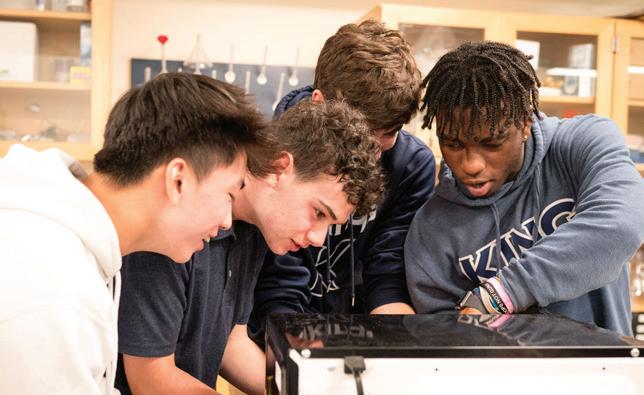
Maoz and her team believe true engagement readies students for the next step in their education — and it creates the best
opportunity for students to have happy, healthy, successful, and purposeful lives.
She concluded, “At the end of their King School journey, our students move on to the next stage of their lives, prepared to make an impact and better the world.”
“This is the kind of learning that delivers skills and foundational knowledge while creating a sense of meaning, confidence, and desire to know more,”
— Carol Maoz, Head of School


In an ideal ecosystem with an optimal combination of temperature, light, shade, humidity, and lots of determination, King School students successfully bred a critically endangered frog.
The eventful arrival of the three red-banded tadpoles took place not in a South American rainforest but in an upper school biology classroom in a student-built vivarium that has been transformed to reflect their habitat.


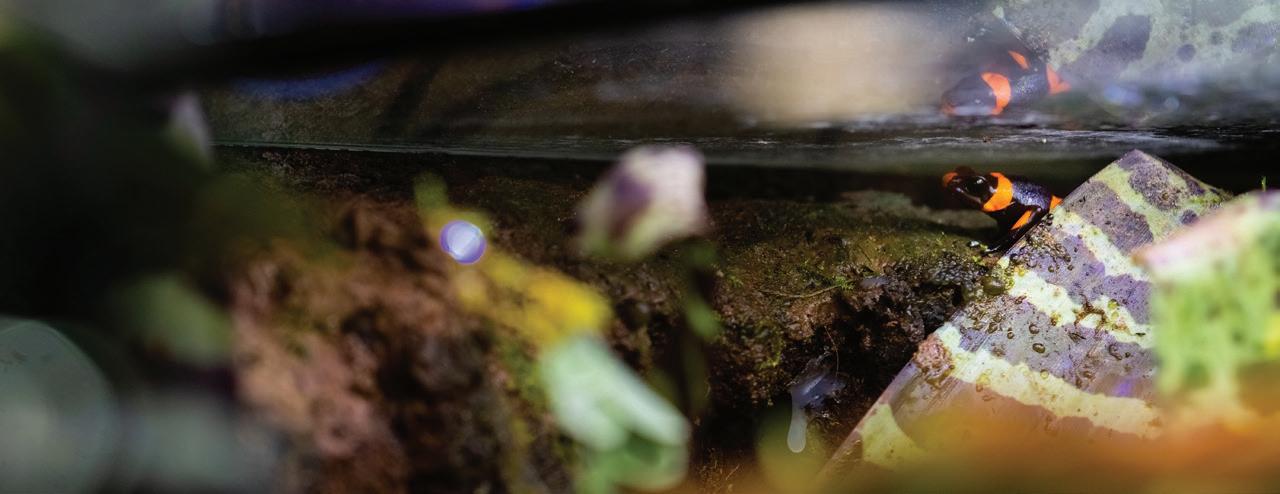
“It's crazy!” said Ellie Wayland ’23, who has seen the project take shape since her freshman year. “It’s so incredible that something like that could happen right here, that we are helping the survival of an entire species right here in the King School science classroom.”
“The reason we chose this species of frog is that they are considered critically endangered and very challenging to breed in captivity.” said Nick DeFelice, Chair of the Science Department at King. DeFelice is spearheading the King School Frog Conservation Project, a co-curricular activity that attracts upper school students to apply their passion for conservation through education and action.
The red-banded dart frog’s scientific name is Oophaga lehmanni, in honor of Colombian conservation biologist Federico Lehmann. The frog is endemic to a small section
of rainforest in the Anchicaya valley of western Colombia.
The bright coloration of this frog is a warning display of their toxicity. DeFelice explained, however, that the frog is not poisonous when in captivity.
Both the Convention on International Trade in Endangered Species of Wild Fauna and Flora (CITES) and the International Union for Conservation of Nature and Natural Resources (IUCN) have classified the Oophaga lehmanni as “critically endangered.” The species is threatened mainly by habitat loss and the illegal pet trade.
Duncan Baird ’25, who serves as president of the Frog Conservation Project heard about the project when his sister, Paige Baird ’22, and former president of the project, made significant contributions to the success of the vivarium construction and the introduction of the first breeding pair of frogs. He, too, wanted to be a part of it. “I just really want to make a difference in the world by helping preserve an endangered species,” he said.
The idea to build the vivarium at King was proposed in 2019 by Nic Perez ’19 and James Hilton ’19. They asked Head of Upper School Marnie Sadlowsky for approval and funding to pursue the creation and operation of a rainforest vivarium for a senior project.
“This vivarium would present an opportunity for the school to teach students about the complexity of nature and the structure of ecosystems, and support the possibility of King being involved in the breeding of threatened rainforest amphibians,” the two seniors stated in their written proposal.

After the school approved the project, a group of students regularly collaborated with DeFelice to tackle a wide range of startup challenges. The students began to build a living, biologically cycling ecosystem.

The initiative became a multidisciplinary endeavor. For the past four years, students have been involved in the precise measurements and calculations for the engineering, design, and operation of the tank. They have researched options and created hypotheses for the environments needed to sustain tropical vegetation and amphibians. They have collaborated and designed creative solutions to the obstacles they encountered. As some students graduate, others have joined the project.
application and approaching problems with creative solutions, but about how important conservation truly is.”
Alesia Paz ’21 said: “I've learned a lot about what it means to create an artificial environment that can host and sustain an endangered species. It's already been so fulfilling seeing all of our work come to fruition, and I can't wait to see where we go from here.”
King’s first mating pair are captive bred from lineages originating from Tesoros de Colombia, or Colombian Treasures, which is an authorized source of Oophaga lehmanni dedicated to curtail the trafficking of wild animals by providing a more eco-friendly alternative: specimens bred in captivity.
— Ellie Wayland ’23
The 250 gallon vivarium rains, produces fog, circulates air, provides ultraviolet and moon light, filters water, and houses over 50 species of plants and various forms of insects, fungi, and bacteria that aid in the nutrient cycles of the tank.
“The construction taught me a lot about problem-solving and using my skills from STEM classes to approach any issues that arose while building,” Paige Baird ’22 said. “The project has taught me not only about using my STEM skills for real-world

The male frog arrived in February 2022, and the female arrived a few months later. DeFelice explains that the frogs have no physical traits that differentiate their gender. The first frog was easier to identify because it made vocal calls as male frogs do. But there were no assurances that the second frog was a female. The students named the mating frogs Peter and Mary Jane, after characters in the Spider-Man comic.
While arranging the bromeliad plants in the tank this summer, Paige and DeFelice noticed eggs. Those eggs were not fertilized, but their discovery provided confirmation of a breedable pair and hope. “Paige and I were ecstatic over the eggs!” shared DeFelice.
It’s so incredible that something like that could happen right here, that we are helping the survival of an entire species right here in the King School science classroom ”
“This didn’t just happen It’s because a community got together and made it happen I feel proud to work at a school that allows visions to manifest ”
— Nick DeFelice, Chair of the Science DepartmentThis fall, that hope was realized as students spotted one tadpole at the end of September and two others in early October. DeFelice explained that there might be others; the females lay three to 10 eggs at a time. The tadpoles, for now, are called Viking 1, Viking 2, and Viking 3. “The fact that both the male and female are comfortable to breed is a testament to all of the research, care, and work from students and others at King,” DeFelice said.
Since the frogs’ arrival, the students have tended to their needs. They feed them insects and, with the support of the school’s facilities team, ensure round-the-clock operation of the tank. The tadpoles eat unfertilized eggs. Once they transform into frogs, they will eat the same food as their parents.

DeFelice is grateful for the support the project has received from the school. “This didn’t just happen,” he said. “It’s because a community got together and made it happen. I feel proud to work at a school that allows visions to manifest.” He added, “It was awesome to see the collaboration and passion of the students come together synergistically to produce this tangible outcome.”
Eliza Heaton ’20 reflected on her involvement with the project. "I never thought I would be able to dive into such an immersive
and unique experience until I was asked to take part in a project to replicate a rainforest habitat in the classroom,” she said.
Heaton added that she derived great joy from creating a habitat for frogs that do not naturally exist in Connecticut and that she and her fellow students applied their biological knowledge “to appreciate life flourishing in real time.”
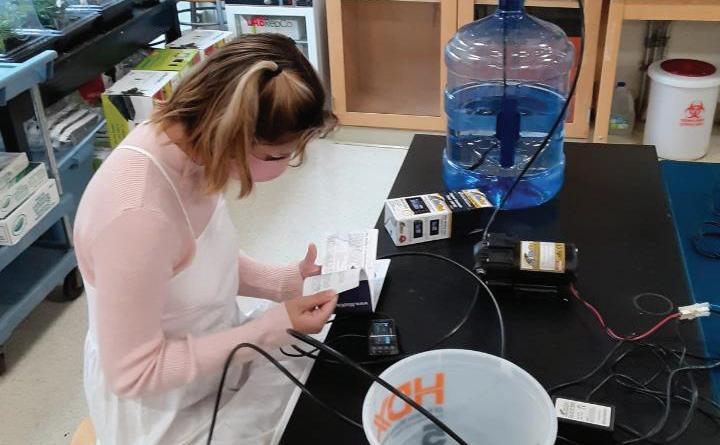

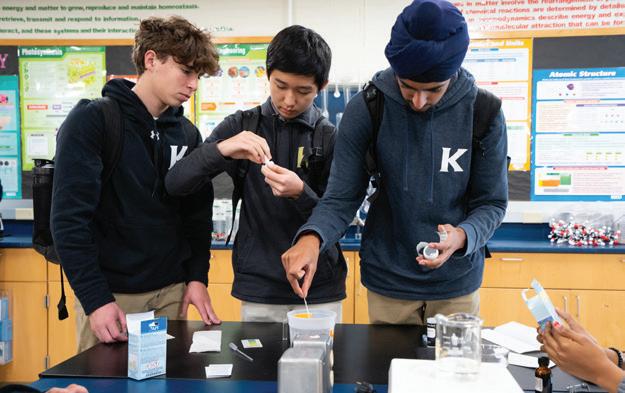
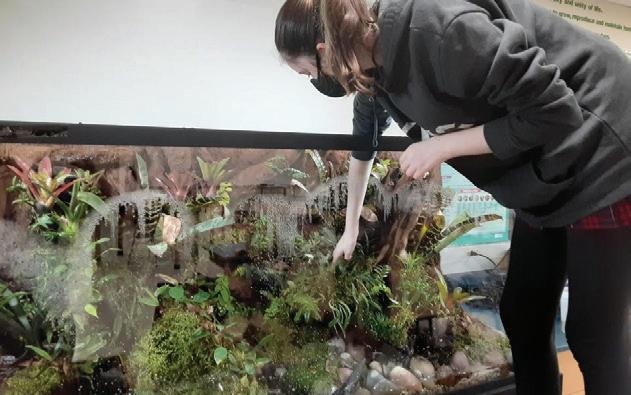

Jake Cohen ’20 described his participation in the project as “one of the most immersive and memorable learning experiences” he has ever had.
Sadlowsky lauded the project, saying: “The success of this project is the result of our students’ curiosity, tenacity, and skills, and the research mindset that our teachers strive to instill in them. This accomplishment is a perfect example of students learning about and working collaboratively to solve real-world problems.”
When told about the successful breeding of the frogs in the tank that he and Hilton proposed in 2019, Perez felt a sense of achievement, saying, “I wanted to do something that would last and hopefully bring a little bit of joy to future generations of students while preserving life.” His message to current and future students: “Sometimes you have to just go for it.”
Hilton added: “To look back on my senior project and to learn how far it has come is incredibly rewarding. Not to mention there is real conservation work being done within the walls of King School! I am beyond impressed by my younger peers for picking up where we left off and beyond inspired by Mr. D."
DeFelice said that the frogs bred in captivity are not genetically apt to survive in the wild, but he hopes that the Frog Conservation Project can continue to attract the interest of students. He also hopes they can contribute to the understanding of this endangered frog and partner with research and educational organizations in the country to spread awareness and help preserve this precious and colorful species.
“I've learned a lot about what it means to create an artificial environment that can host and sustain an endangered species ”
—Alesia Paz ’21
Research at King School took an adventurous turn as students examined pirates, wizards, and villains in preparing roles for the Performing Arts Center stage during the 2021-22 season. All three divisions mounted a total of nine productions, and the script analysis and role development were apparent in the ovations brought by each performance.
The course of staging “The Wizard of Oz,” “The Pirates of Penzance,” and “Press Start!” began with a lot of questions. Students explored how an author uses scene settings, language choices, music arrangements, and character interactions to tell a story. In a quest for understanding, the casts collaborated on literary and musical theory, and the nuances between them, in a process that yielded selfdiscovery and personal growth.
“When preparing a role, students not only research by learning about the historical and cultural context of the production,” said performing arts teacher Amy Darnton, “they do a great deal of ’inner research’ as they apply their imagination and explore ways to bring aspects of their own personalities to the roles they are playing. This is deep work that has implications for their understanding of themselves and the world beyond the stage. It’s one of the most unique and valuable aspects of educational theater.”
The upper school thespians chose to tackle W.S. Gilbert and Arthur Sullivan’s comic operetta “The Pirates of Penzance.”
The musical follows the tale of Frederic, a young pirate who finds himself torn between loyalty to his peers and love for a woman named Mabel.

The range of emotion in the comically charged story was matched by the range of notes in the songs, presenting quite a challenge for Zachary Louizos ’25, who sang Frederic’s demanding falsettos.
she said. “She encouraged me to sing in ways I never thought I could before.”
Guided by Darnton, middle school students traveled down the yellow brick road exploring friendship, perseverance, good, and evil as they tried to find their way home in “The Wizard of Oz.”
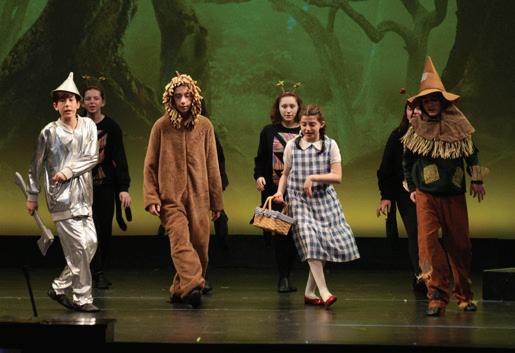
Ollie Mansfield ’27 discovered a bit of himself in the role of the Wizard.
“I love participating in the plays because it lets me show who I am,” he said. “As Ms. Darnton always says, ’Acting is a living form of art.’”
Anaiya Shah ’27 transformed into the treacherous witch.
“I loved how challenging it was to become the Wicked Witch of the West because it was a whole different personality for me,” Anaiya said, adding that collaborating was crucial to her success in the role. “I didn’t start to memorize my song until a few weeks before the performances, but with the support of the cast and Ms. Darnton, we were able to put together an amazing musical.”
The lower school players left the classics to the older actors, opting instead for a more modern musical and saturating the theater with neon video game lighting in “Press Start!” The performance featured heroes, sidekicks, and villains working together to earn gold rings and advance in the game.

For many students, this was their first show of this magnitude. They learned to prepare for auditions and, once cast, they followed the steps necessary to take a show from a table read to the PAC stage. During the process, they practiced reading with expression and clarity, singing in tune, and projecting their voices.
In the lead role of Little Mushroom, Clara Kulig ’29 sang her first solo. “Outside of school, I don’t take professional singing lessons or anything,” she said.
Clara understood Little Mushroom’s growth from timid to courageous.
the students dive into the shows, parsing the scripts to better understand the characters, the stories, and themselves.
“For students, at a time when they are trying to figure out who they are and where they belong,” said Darnton, “to be able to be part of a story, to step back and take on another identity and explore emotions and connections without being out in front as themselves, to step behind the fourth wall of a theatrical production has real value. I see it play out in school as they go through their day.”
In addition to the musicals during the 2021-2022 season, the Upper School presented “Macbeth,” the Middle School staged a play called “Triple Trouble,” and all three divisions performed in vocal and instrumental concerts in December and May. The success of King’s thespian program is gaining momentum, with 15 students traveling to Edinburgh, Scotland, to perform at the Fringe Festival in August 2023.
“Students who have been in the program over time have grown tremendously; our school’s acceptance into the Fringe Festival demonstrates that growth,” said Darnton, adding that this is the third year King students will travel to the Caledonia stage. “As a result of their work in the Performing Arts program, the students are ready to take a risk, and be out there, and connect with people and step up. That is what we are trying to help our kids learn so that they grow and become citizens not only of our school, but of the world.”
“The biggest challenge I faced was being able to sing some of the higher notes,” said Zachary, who worked with voice teacher Stephanie Gregory to prepare for the role.
“My favorite part about playing Frederic was being able to embody the naivete of the character and use that trait to create hilarious interactions with the other characters,” he said.
Luisa Simon ’23 also worked with Gregory as she rehearsed for the role of Mabel, which called for her to reach high C, in the upper end of a soprano’s vocal range.
“I was truly astounded by what Ms. Gregory was able to extract from me when we began the rehearsal process for this show,”
“Little Mushroom is a sidekick that wants to be a hero but is always told to step out of the way so others can have a chance to shine,” she said. “I can definitely relate to the character. I can be shy sometimes, but once I’m comfortable, I can be confident too.”
Adria Mallette ’29, who played the role of Pac Anne, found that the experience strengthened her public speaking skills, which served her well in her role as a representative on the Lower School Council.
“I have really long lines, so it was difficult to memorize everything,” Adria said, adding that she is no longer nervous in front of crowds. “I used to have a fear of messing up in front of people, but being in plays has taught me that if I make a mistake, it’s better just to keep going.”
Productions often have multiple casts allowing students to play leads one night and supporting roles the next. Together,
“I can definitely relate to the character I can be shy sometimes, but once I’m comfortable, I can be confident too ” — Clara Kulig ’29
Throughout the King School art program, across all divisions, students participate in the Original, Personal, Experienced, and Novel, or O.P.E.N., project. This approach allows students to explore ideas and follow their curiosity as they try different mediums of art and create projects that are an expression of their interests.
For advanced artist Jamie Munno ’22, inspiration came from the flowers in her grandmother’s garden. As her senior project, she designed her first dress collection, which took hundreds of hours to construct. When Jamie showed it for the first time in April at the Art Colloquium in the Performing Arts Center, she was met with applause and confetti as she stepped into the spotlight. The students who modeled her creations lined the stage behind her and shared in the celebration.
Jamie’s fashion show was one of 11 presentations during the two-day Art Colloquium. Although every student at King has done an O.P.E.N. project, advanced art students spend an entire year immersed in the endeavor. The senior students in the advanced class showcase their accomplishments at the Art Colloquium.
Just offstage, art teacher David Hughes was thrilled with the presentations. He had seen the journey. He had seen the setbacks, the breakthroughs, and now the triumphs. He was overwhelmed with emotion.
“It was the highlight of my professional career,” he said. “I was so proud. I remember pulling them aside and telling them how
proud I was. I knew how nervous they were about doing it, and I was holding my breath as I watched. Seeing it all come together was amazing.
“The senior year projects are completely student driven,” Hughes said, adding that each student chooses an idea and creates a curriculum.
“The students do a lot of brainstorming and choose a theme that informs their artistic explorations the entire year,” he said. “Their theme is personal and relative to their life and interests. It is amazing to witness how their work becomes more sophisticated, and their theme evolves throughout the year as they grow as both artists and people.”
Another advanced student, Anna Sheridan ’22, discovered abstract art in her junior year and loved it. She devoted her senior year to the style. During her evolution, she learned to both evoke and express emotion through art. Anna’s Art Colloquium presentation featured a work called “Something to Remember Me By,” a brilliant painting about navigating grief and tragedy while trying to hold on to happy memories.
“In my initial sketch, I used my normal process, which makes up the main part of this painting,” she said as she discussed the work displayed on a large screen before a packed theater. “I wanted to write down memories of someone I had recently lost in a tragedy, then I painted over it in a black rectangle to remind myself and everyone that the memories are always there even if they get overshadowed.”
Anna described her exploration of abstract art as freeing: She learned to let go of her need to control, and this ability was central to the emotional gains that came from the process.

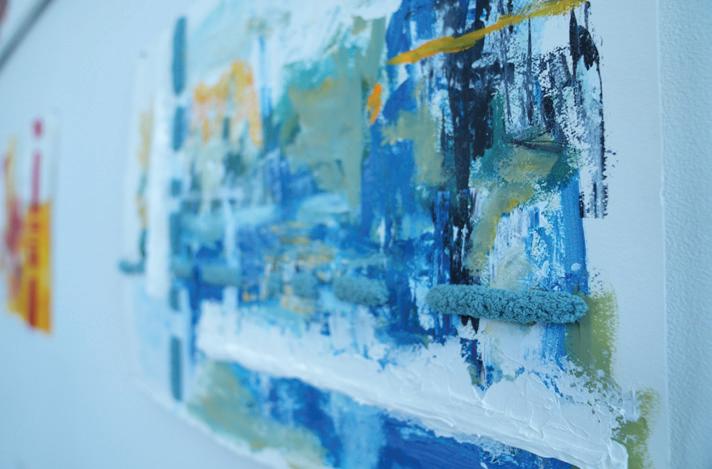
For Jamie, who started dressmaking as a child in her grandmother’s home atelier, it was fitting that her grandmother’s garden inspired her first collection. She likened the growth of the senior artists to that of a flower, adding that her own skills had blossomed as well.

“Through the process, not only does the collection of dresses grow, but my skills, passion, and my own discovery of self grows as well,” she said. “Each dress is connected to me and reflects an important aspect of my life, whether it be a person, place, or feeling.”
Her collection took eight months to realize, with up to five hours of daily workshopping in the art room. She thanked Hughes and art teacher Ran LaPolla for their patience, guidance, encouragement, and support.
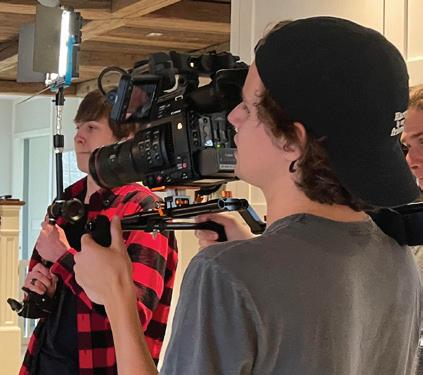
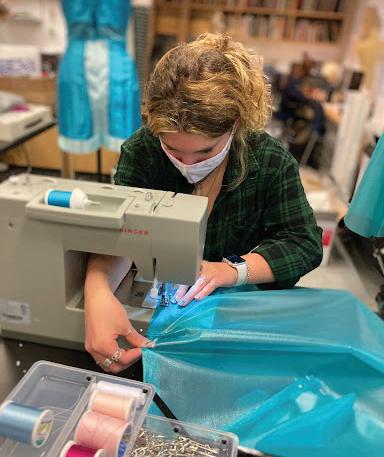


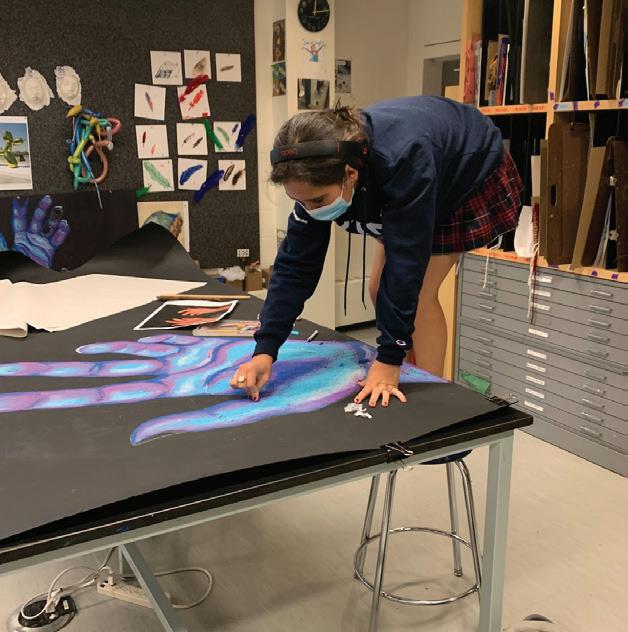

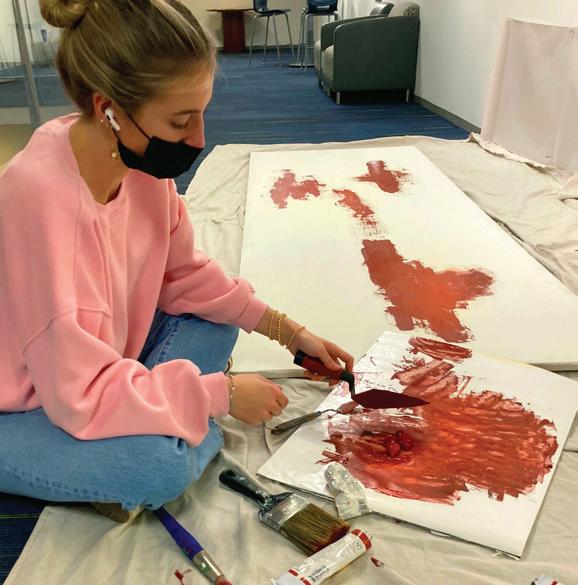
The other seniors who presented their work at the colloquium were Emily Alexander, Emmi Freeman, Paige Baird, Jordan Rogers, Sarah Cepeda, Maddie Blattman, Riley Mohr, Alex Resnick, and Norah Shattan.
As the confetti settled, the crowd gathered in the PAC for a reception celebrating all of the advanced senior artists and their achievements and self-discoveries.
— David Hughes, Art Teacher“It is amazing to witness how their work becomes more sophisticated, and their theme evolves throughout the year as they grow as both artists and people ”
Academic life at King School extends to conversations and spaces that are far from the classroom. King’s Athletics Department is known for its excellence. The titles lining the walls of the athletics building demonstrate its prowess. The secret behind all of those victories is the program’s intellectual approach to teaching, learning, and training, a nod to the depth and reach of the King education. Step inside the gym, and hear questions about biology and anatomy. Sit courtside during foul shot practice and hear discussions of arcs and curves. Watch the crew teams climb into the shells along the dock and hear discussions of resistance and friction. Listen to the football team as the players parse game tapes. Their conversations about performance and how to improve it are crucial to King’s competitive edge.
“Every athletic experience lends itself to learning,” Dean of Athletics Micah Hauben said. “Our crew athletes and coaches research how stroke rates and erg training can translate to performance on the water. Our expanded strength, speed, and conditioning program is using Functional Movement Screen testing, which athletes use to develop plans that help with injury prevention and performance.”
Indoor rowing machines include an ergometer that measures work by breaking down the number of strokes per minute, the distance traveled during a workout, and the speed.
“On the ergometer, the resistance is the same for every athlete, so if all things are equal in terms of fitness, the larger
person is going to go faster,” said Doug Fishkin, who founded the King rowing program seven years ago and now serves as the director of the program and coaches the varsity boys and girls teams. “In the boat, that larger person makes the boat sit lower in the water so it has a more wetted surface and more water resistance to overcome.”
“You could be the strongest person in the world, but if you are not rowing efficiently, you are not going to go very fast in the boat "
— Doug Fishkin, Crew Program DirectorTo offset the ergometer, they use a weight-adjusted time. In addition to considering the physics of resistance, rowers have to consider the efficiency of movement.

“You could be the strongest person in the world, but if you are not rowing efficiently, you are not going to go very fast in the boat,” he said. “The stroke has two major components. You have the drive where the oars are in the water and you are moving the boat, and then you have the recovery where you are setting up for the next stroke.”
The movements take athletes time to learn. “We break it down into basic parts and create an order to the recovery: arms, body, legs. It takes a good two years to master that and to understand the physics of it,” he said.
Spencer Neckritz ’24 is an experienced rower. “Crew is very science- and physics-based because of the water involved,” he said, adding that he and his teammates study the weight distribution of the rowers inside the boat.
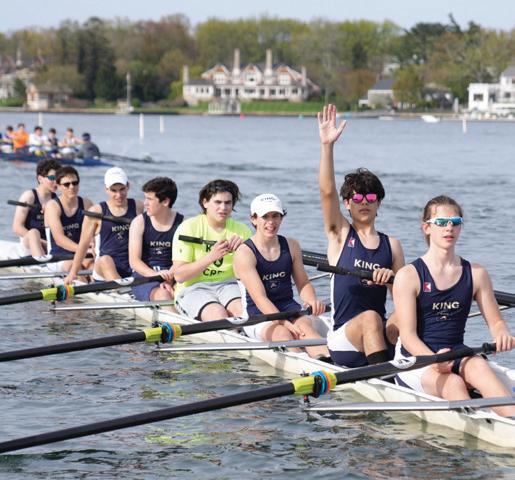
“Weight-to-strength ratio is a huge part of the sport,” he said. “There is a lot of research that helps us optimize the speed of the boat, and our coaches help us maximize our efficiency. We are always asking questions whether on water or land because the technique is so important.”
Science and math are also central to the strength training program at King, where plans are tailored to the interests and goals of each athlete.
“Training appropriately for the energy systems that the athletes need to excel in a given sport is essential to improving performance, and also to alleviating injury and
— Spencer Neckritz ’24
fatigue,” Head Strength and Conditioning Coach Bonnie Roberts said. “Two athletes may come in to work out together in their offseason, but their physiological needs may be different for each sport.”
Students are part of building workout plans, so as they achieve their objectives, they are also educated as to why they’re doing specific exercises.
“In soccer, the average player runs six to eight miles but also needs the ability to change directions, jump, sprint, and kick,” Roberts said. “They mostly use the aerobic energy system but also need to train anaerobically, so a workout that works on these things with a higher rep count is ideal for soccer athletes. Hockey athletes are usually on the ice no more than two minutes at a time, needing the ability to produce force quickly to skate at top speed. A power-based workout with fewer reps is needed to train the anaerobic system to fire efficiently through a game.”
The application of science and research is at the center of every discipline at King, as questions drive learning, and answers yield improved student performances. By incorporating math, physics, and anatomy into training, King Athletics has honed a competitive edge.
“There is a lot of research that helps us optimize the speed of the boat, and our coaches help us maximize our efficiency ”

The highlight of the September 2022 State of the School was a panel featuring six upper school students who discussed their experience with King’s inquiry-based approach to teaching and learning. Head of School Carol Maoz moderated the event, which featured Gouri Krishnan ’23, whose focus is on the sciences; Amy Powell ’26, who is interested in the humanities; Kioja Duff ’25 and Maddy Beck ’23, who both have a passion for the arts; Bryce Heaton ’23, who is mastering music; and Spencer Neckritz ’24, who infuses inquiry and research into his athletic training. Here are some highlights from the discussion.
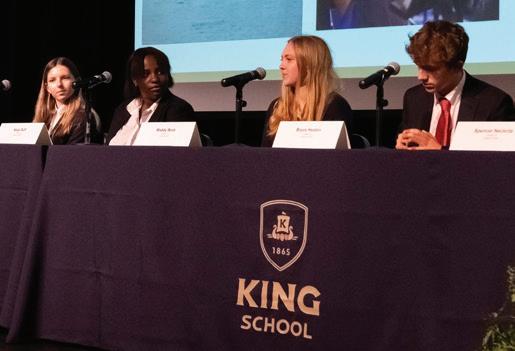
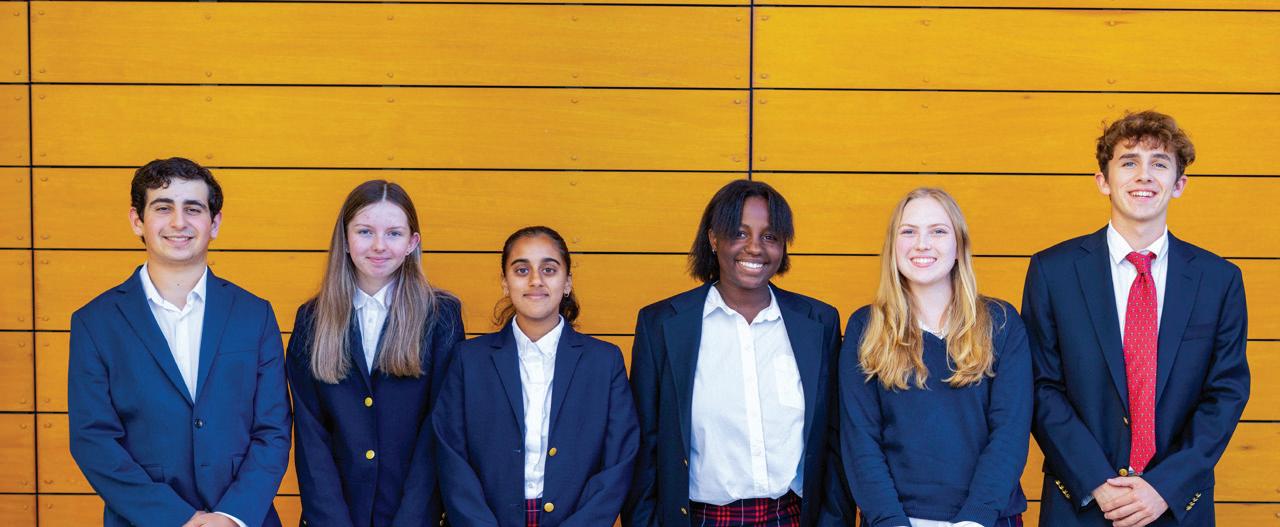
Maoz: Gouri, you have been involved in science research since ninth grade, and you won the Connecticut State STEM Fair last year Can you tell us a bit about your work?

Gouri: With an interest in clean energy, my research focused on the development of energysaving electrochromic or colorchanging windows to reduce energy wastage and energy usage in businesses and homes. My design reduces energy loss and mitigates climate change by reducing the amount of carbon emissions buildings give off while maintaining indoor climate control.
I also wanted to incorporate a more human aspect to my project, especially as the COVID-19 pandemic led to increased rates of depression and mood swings. After doing some research and questioning, I found that the use of these windows could also be linked to a positive change in mood, which is something I found very fascinating.
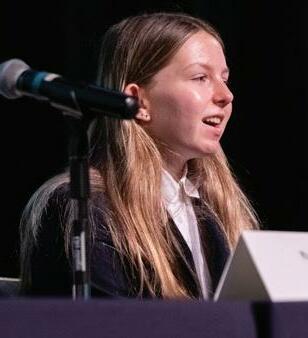
Maoz: Amy, last year in eighth grade, you were involved in a research project involving activists Can you tell us whom you chose, why, and how you went about your research?
Amy: My partner, Gillian Lehneis, and I chose a woman named Anna Landre, who was born with a genetic disorder called spinal muscular atrophy. When she went to Georgetown University, she required an aide, and the state of New Jersey cut funding for the aide. She engaged in a legal battle, which she won.
By doing this research we learned how the world works for people with disabilities and how difficult it is for them to receive funding and to face the daily challenges they are born with, and also face the challenges that governments and insurance posed to make accessibility harder.
Maoz: You also built a model Can you tell us about it and how you put it together?
Amy: We created a sculpture of a staircase with a ramp going up the middle and at the top was Anna Landre in her wheelchair holding up a sign. That sculpture meant so much to us because we worked so closely together, and after making our presentation to our peers, we also got to see all of our peers present their research, to see what issues mattered to them. We learned a lot about our peers through this process.
Maoz: Kioja, you have many interests, but I would like to focus on your O P E N project in art class Can you tell us a little about the research you did?
Kioja: My project came from the idea of social justice issues that I face in the real world. I took women’s rights, racism, and LGBTQ+ rights and I put it all into one piece. Each panel represents an album or song cover for these social justice topics. The canvas represents the light and the dark, or the good within the bad; each issue of this piece represents not just the hardships of life but also shows the beauty that you can find within.

To research this topic, I took what I learned from my classes and used all the databases I could from my King classes as well as all that my art teacher, Ms. LaPolla, provided with books in her room. I also took time to use critiques in class to let each student weigh in, and this helped my work evolve into what it is today.
Maoz: From your perspective, what do you like best about the O P E N project and what do you think makes it unique?
Kioja: There are no restrictions on what I can do; my imagination is limitless and I am able to do and create whatever I want. There is no curriculum. I am able to take materials and start and try again, and there is no pressure on how to portray what I do.
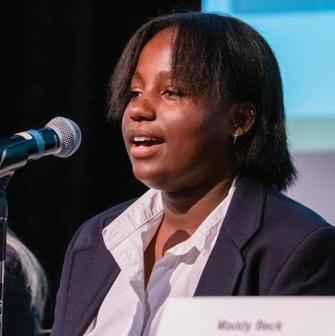
Maoz: Maddy, you are a talented artist and your work represents your interests and activism .
Last year, you focused on feminism . I am lucky enough to have three large pieces of one of your installations in my office Can you tell us about your research?
Maddy: Last year, my 3D art theme was an exploration of women’s voices, power, and barriers, acknowledging huge strides toward equality while still highlighting the hardships women face today. I decided to make large portraits of people who represented each of these eras and their quotes, and that is what is hanging in your office.
Over the summer I realized I needed to narrow that theme so I could make my work more personal. I knew that I needed to make authentic art so that it would sustain my interest throughout the yearlong course of the advanced art project. I learned a lot about preserving and believing in my vision.
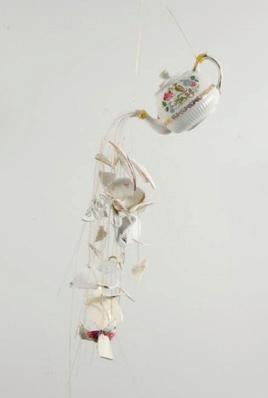
There is a photo of me on the floor drilling into porcelain as I worked on a teapot project about femininity and shattering the status quo. I spent three months on the floor drilling and shattering teacups, going to different thrift stores, and buying new ones. But by the end of it, I had learned so much about believing in myself. For me, art class has been a great way to exercise my inquisitiveness, find myself, and exercise the ability to do research.
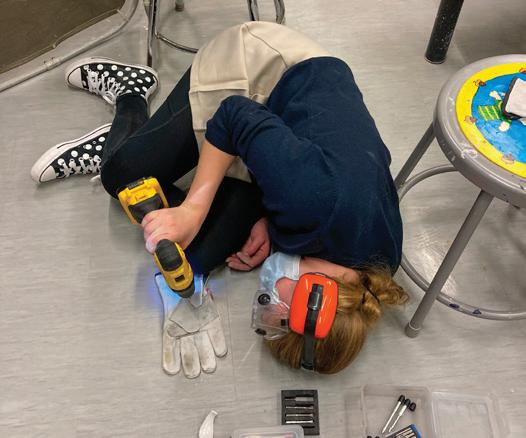
Maoz: Bryce, I know you are a musician, and in particular a trumpet player, and you have an interest in jazz . Last year, I was impressed by your performance at a school concert Can you tell us how research and inquiry played a role in that performance?


Bryce: In band class, Mr. Mendez sat us all down and gave us a piece of music called “A Night in Tunisia” by Dizzy Gillespie. He first wanted us to research the artist before playing the piece. We found that Dizzy Gillespie was the first jazz ambassador to America. We learned about the African American history in jazz, especially in the 1920s, and how African Americans used jazz to spread their message across the entire world. We learned that when playing trumpet, you are not allowed to puff your cheeks. But this guy did not listen and completely puffed his cheeks all the way out, so while learning more serious history about his impact in the jazz world and the civil rights world for African American rights, we got to learn some fun facts along the way.
Pairing this song with the research we did behind it, I believe, made us play better because we could play the way he wanted us to play it, while also knowing the deeper meaning behind that piece and behind that artist.
Maoz: Last year, you and another student were awarded the Tom Main Liberal Arts Fellowship This research project is awarded to a team of two outstanding sophomore students who, working with a faculty mentor, research, write, and present a paper on a liberal arts topic of major global interest Can you say a few words about your research?
Bryce: Our guiding question was: How does neo-fascism affect global democracy? My partner, Tommy Heaton, and I read journal articles and books, we watched documentaries and movies, and the best part about our research was that we got to interview Dr. David Frye, who is a professor at West Point, and we had a Zoom interview with a current Proud Boy member, which was eye-opening. We were able to present all of this research to the entire school. It was awesome to see how King had us apply research and inquiry and then show it to all of the students, which generated more questions and research.
Maoz: Spencer, you are a serious rower Can you describe how research comes into play in the sport of crew and how it has contributed to your success?

Spencer: Crew is a very science- and physics-based sport, mainly because of the water involved. Drag is caused by the way the water slows down the boat. The weight of the people inside the boat can push down the boat and cause more drag. So weight-to-strength ratio is a huge part of the sport. We are always asking questions, whether on the water or on land, because technique is so important to keeping our drag down and our speed up.
Maoz: You mentioned that you are on the debate team Are there any connections you can make between the research you do for the debate and the research you do for crew?
Spencer: Crew and debate are both about asking questions in some form. In crew we are given a way to improve our technique by coaches, then we ask more specific questions to get the technique down even better.

Debate gives big, overarching world questions that we have to research contentions for. We have to have a claim better than the other side, but we also have to be able to argue both sides. In both, I start with a basic question, and then I can go into much more specifics in my research and the questions I ask.
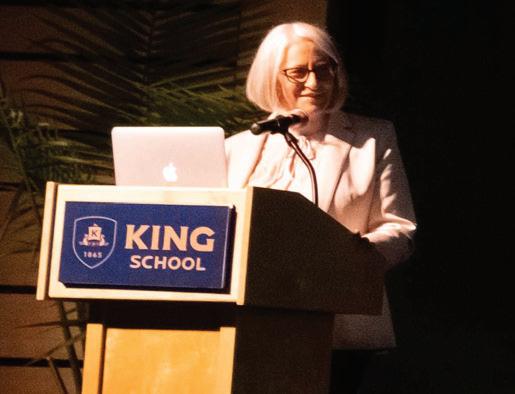
“What do you think is the advantage in learning through asking questions, conducting research, and following your passions? How is that more effective than other ways of learning?”
“What we learn through research and inquiry does not only stick and is not only used to study for a test, but it actually draws us students in more, it gets us more involved in the classroom, more involved in a topic, and more wanting of an answer ”
The journey began with computer programming, the first of many electives Charlie Keating ’17 signed up for at King School. He was certain it would be his first step toward a programming career. Then he opted for a class that took a close look at the horrors of genocide, and another exploring the causes and effects of poverty.
Keating spent his four high school years indulging his interests in a wide range of topics, all while keeping up on his core classes. When he arrived at Villanova University, he saw the benefit of his explorations.
“King gave me a lot of options,” he said. “I was able to follow my curiosity and let that lead my learning process. So many people get to college and have no idea what they want to do. I was fortunate to have the opportunity to take electives in high school, and it made that process of trying to figure out what I did want to focus on that much easier.”
Keating still employs his research skills in his career as an analyst, gathering, analyzing, and translating data into
useful information in the finance sector. He credits the perseverance he cultivated at King for helping him realize his success.
That he liked math was a discovery he made early at King. Though it did not come easily at first, he stuck with it and, in time, became an excellent math student. He had a similar experience in college, where he decided to explore microeconomics.
Rather than shy away from the challenge, he persisted.
“This was also something I learned at King, perseverance, and that made all the difference,” he said. “I really liked math, and I did not give up. Likewise with economics. After that initial struggle, I knew how to find what my strong suits were and how to identify what I needed to work on moving forward. I learned how to study at King; I was prepared for struggles that I would have in college because I had the skills to persevere.”
“ I learned how to study at King; I was prepared for struggles that I would have in college because I had the skills to persevere ”
“I did poorly in my first economics class,” Keating said. “But I really enjoyed combining economic concepts with the more analytical math skills that I had developed in statistics at King. Statistical analysis in economics is really important.”
Keating’s tenacity led to a major in economics, as well as minors in both business and Spanish. He received cum laude honors and was a member of Omicron Delta Epsilon, an international honor society for economics.
Upon graduation in 2021, he joined Mirador, a Darien-based firm in the wealth management industry that operates and maintains the performance reporting systems for family offices, foundations, endowments, and wealth managers.

During the hiring process, he and one
of the firm’s founding partners, Mike Pakula KLHT’07, realized they shared more than an interest in economics: They had both graduated from King.
Every year, alumni are invited to return to King School for Career Day to share their professional and life experiences with upper school students. In April 2022, Charlie Keating ’17, Jesse Freedman KLHT’00, Clare Nichols Drebitko KLHT’92, Ruthie Hubbard KLHT’08, and Rob Kligman KLHT’92 discussed their careers and offered advice to students regarding life after King.
Read about the panelists in these Alumni Profiles.
Keating was a financial reporting analyst for Mirador before joining Bank of America Private Bank as a family office servicing associate. He can still see the benefit of his King education.
“Each client is slightly different, and each client presents a different set of
challenges,” he said. “Being able to use critical thinking skills to solve various problems is something I have really enjoyed and something I have felt very prepared for as a result of my time at King.”
Keating credits his King teachers with giving him confidence.
“At King, the teachers were there to help you, but they also wanted you to put in the effort and try to figure things out
on your own before going to them for help,” he said. “I think that is something that has always served me well both in college and now in my job. It is important when you face a challenge, rather than say I have no idea how to do this, think about it on your own and then, if necessary, ask for input. King did a really great job instilling this.”
The producers of “Harry Potter and the Cursed Child” were looking for someone with a rare combination of skills to help with the play’s global rollout. Based on J.K. Rowling’s story, the production had been greenlit for seven stages around the world, complete with a big budget, great actors, and loyal fans lining up for tickets.
The international powerhouse Sonia Friedman Productions needed someone to cast Lumos; a true Minister of Magic who could reveal the wizarding world to a theater full of nonmagical Muggles.
They found one in Jesse Freedman
KLHT ’00, a multidisciplinary theater artist, director, playwright, educator, sound designer, and yes, magician. His skills as an illusionist attracted the producers.
He was recruited to join the team as an Illusions Associate tasked with realizing Potterverse fantasies. After three years with the Broadway production, Freedman was sent to Tokyo in early 2022 to set the show up there.

“Never in a million years would I have imagined working on a commercial show like Harry Potter on Broadway,” he said. “I have a strong identity as someone who makes dense, multimedia dance shows out of warehouses in Brooklyn. But when Broadway came knocking, they were looking for someone who knew how to speak different technical languages. I can do all of those things, and I also have a background as a magician.”
Propelled by intellectual curiosity, Freedman has spent his career immersed in the magic of live theater.

He is a co-founder and artistic director of Meta-Phys Ed., a theater group based in New York City that produces work exploring religion, culture, and politics.
“My theater has been described as genre-bending,” he said. “I am looking to take recognizable forms of theater or performance and literature and shape them into something new.”
myself in a very different way,” he said.
“I discovered this new way of learning. I discovered a new part of myself, and these new skills applied across all aspects of my life.”
That perseverance has stayed with him.
“To this day,” he said, “whenever I face an obstacle and question whether I can overcome it, I just think back to that time and think: ‘Well, I did become a really, really good lacrosse player, and I did not even know what lacrosse meant on my first day at King. Therefore, I can probably learn how to do anything if I just give myself enough time and work hard enough.’”
From King, Freedman went to Eugene Lang College of The New School in New York City to study theater and liberal arts. New York was thrilling, but its community was fleeting.
“I realized then how much the structure in the KLHT community was a uniquely nurturing experience for me,” he said.
Freedman’s achievements stem from years of hard work and fearless selfdiscovery, qualities he traces back to his formative years at King & Low-Heywood Thomas School, where he arrived at the start of eighth grade.
“At KLHT hard work was expected, so I adopted the patterns and habits of applying myself to academics and they became my norm,” he said, adding that sports posed a different challenge.
“Through sports, I learned how to push myself and track growth and progress in
As he started his second year, the 9/11 terrorist attacks destroyed the World Trade Center just two miles from his college. The following spring, he took a leave and spent a year traveling to Israel, Prague, Scotland, and Greece, backpacking, and reflecting. Like lacrosse, the experience yielded selfdiscovery and growth.
“When I went back to school, I applied myself to theater-making in new ways,” he said. “I began to focus on writing and directing instead of just acting.”
After graduating from Lang, Freedman produced new work and developed theater communities in New York, Baltimore, and Cleveland. Then he chose to continue his education at
Sarah Lawrence College, ultimately earning a Master of Fine Arts in theater.
In graduate school, he added carpentry, woodworking, modeling, and fabricating to his skill set. Having gained the confidence that he could learn anything, he began growing Meta-Phys Ed.
Freedman also became a teaching artist in a variety of theater and academic settings, modeling his technique on the example set by Elizabeth “Boo” Forster.
A drama teacher at KLHT for 46 years, Forster died in 2014 at 98. She lives on in the encouragement Freedman imparts to his students.
“Ultimately, the artist is out there by themselves,” Freedman said. “You cannot do anything for them. But it is so powerful knowing there are people who believe in you. Boo was that for me. She really believed in me, and that has been a real gift.”
Though he has drawn the attention of Broadway producers, commercial projects are not his main objective. His passion lies in the art. Freedman is committed to operating a theater that serves as a community hub for conversation, where creators and artists find opportunities, and where Muggles are transported by the magic of the medium.
Drebitko KLHT’92 was entering her senior year at the University of Delaware with a double major in history and psychology, she had never ventured beyond mandatory science requirements. But in 1995, her internship with a team that procures organs from human donors in Sydney, Australia, changed the course of her life.
“Traveling with the team on donor runs and watching them transplant the organs into people who needed the organs to survive was amazing,” said Drebitko, who was transfixed by discussions of the surgical procedures and preservation methods doctors used. “I realized then how fascinating medicine was, and that it was a really good fit for me.”
The internship introduced her to cardiologists, pulmonologists, cardiothoracic surgeons, nurses, social workers, and psychologists. Their problem-solving and continual searching for answers offered the kind of stimulation she wanted in a career.
“From the moment I arrived, I was taught how to work hard, how to ask hard questions, how to manage a big workload, and how to use time efficiently ”
“The importance of lifelong learning in the field of medicine drew me to the field because it is constantly evolving based on scientific research,” she said.
“It was my time at King that made me realize the importance of lifelong learning, and I knew I wanted ongoing learning to be part of my career.”
Drebitko also sought to serve the greater community with a focus on pediatrics. The journey to becoming a medical doctor took her to New York University for pre-med studies, Harvard’s School of Public Health for a year of research, and finally Yale School of Medicine, where she graduated in 2003.
During her days at King, which was Low-Heywood Thomas School when she entered in fourth grade, Drebitko developed the criteria she wanted in a career.
“From the moment I arrived, I was taught how to work hard, how to ask hard questions, how to manage a big workload, and how to use time efficiently,” she said, adding that she still practices the habits she developed at the school. “Learning how to write a really good paper was one of the best gifts I got from my King education.”
Low-Heywood Thomas merged with King School to create King & LowHeywood Thomas School when Drebitko was in ninth grade. The same year, she and some of her classmates formed the school’s inaugural girls soccer team. Her time on the pitch became an extension of the classroom.
“Most of us had not played before,” she said. “We did not know the rules. The coach did not know the sport either, and we were trying to figure it out together.”
They did not win a game the first season. But by senior year, they were one of the best teams in the league. Drebitko credits her high school athletic experience, as well as her acting experiences on the King stage, for her emotional and intellectual growth.
“Sports and theater present a way to explore different parts of your brain that develop self-confidence and selfesteem,” she said. “You learn about working as a team, about collaboration and cooperation, and those things really help in the workplace. That is where the theater and athletics programs are so special.”
Drebitko also left King with a deep appreciation for community, and she sought to build deep relationships in her professional life.
“At King, I learned how to be a good friend,” she said. “Relationships can get thorny sometimes. You have to work through relationship issues from time to time and learn how to come out the
other side. Those life lessons are an important part of education, not just in academics but how you get along with people, how you work through conflict, and how you respond when someone says something unkind. I learned how to navigate relationships at King.”
Drebitko is based in Woodstock, Vermont, where she is the medical director of Ottauquechee Health Center, a small, pediatric practice that is part of Dartmouth Hitchcock Health. She also teaches at the Geisel School of Medicine at Dartmouth.


“Practicing in a small town is incredibly fulfilling,” she said. “It is very meaningful to have a career that allows me to play such an important role in my community and to build long-lasting connections with families.”
Her career has come full circle: Patients she took care of as children are now adults starting their own families.

“It is such a privilege to help parents raise their children,” she said, adding that she strives to help youngsters develop healthy habits. “A lot of adults have health problems that are the result of poor health choices, and it is very difficult to get an adult to change their habits. Parents are more willing to make changes for the health of their children, so I felt like I could make a bigger difference in longevity and long-term health by focusing on children.”
Drebitko, who works four days a week, spends as much time as possible outdoors immersing herself in nature: gardening, hiking, and kayaking with her husband, Jason, and three children,
Will, Lucy, and Violet. She stresses the importance of work-life balance.
“Medicine is a career I encourage young people to explore because you can do so much with it,” she said, “and you can still have a really balanced life.”
When the coronavirus drove people out of cities and into suburbs, car accidents increased, spending patterns changed, and executives at companies like Progressive, Venmo, and Chase scrambled. Then they called Ruthie Hubbard KLHT’08.
A master in analyzing human behavior and deconstructing consumer habits, Hubbard is the expert charged by Google with helping finance, health care, and pharmaceutical companies identify what people are doing on YouTube and how to engage with them effectively.
Her prowess is built on rigorous selfassessments and a fierce commitment to honoring people from all walks of life. A people person, she is able to navigate different environments and appreciate different perspectives, a talent she traces back to her King School education and her life as a Black woman.

“Understanding how to tailor communication to different people is something that comes from my lived experience,” she said, adding that her upbringing cultivated these skills, which her career continues to build on. “I have a natural curiosity about people, and that has served me well in building relationships.”
At King, she was part of a class of 14 “lifers,” students who start in PreK and graduate from King School together. Those relationships were formative and are still strong today. The skills she developed in the classroom were as resonant.
“In Mr. Galanopoulos’ history class, we had to write essays that fused pieces of
history together by threading trends, implications, and takeaways in a succinct way,” she said. “That has been helpful in my day-to-day life as a business professional because a lot of what I produce needs to connect the dots in consumer behavior, business results, and activity in the macroeconomic environment. I learned how to do that with Mr. G.”
As influential were conversations in Gary Schpero’s history and government class, which Hubbard took her senior year.
man, and James Blake, a biracial man, each from different walks of life, were tackled by New York City police officers in encounters two years apart that resulted in different outcomes. And they brought different reactions from her colleagues.
At the time, Hubbard’s employer was a major sponsor of the U.S. Open Tennis Championships, and Blake was a retired professional player. Her colleagues, many of whom were avid tennis fans, were stunned by Blake’s experience.
“We are ultimately all connected, and it is in the interest of all of us to speak out when necessary, and to uplift everyone we possibly can ”
“Our classroom discussions about the history of the civil rights movement were made more interesting and complex by the momentum of Barack Obama,” she said. “We were seeing those old issues rekindled by his success. I realized then the importance of social consciousness, and I took that with me as I moved on.”
For Hubbard, every major transition in her life has coincided with cultural disruptions, augmenting her nuanced perception of different environments. In 2008, she left King for the University of Pennsylvania, energized by the diversity of Philadelphia and the election of Obama as president. As he entered his second term, Hubbard graduated from Penn and headed to work for J.P. Morgan Asset Management in New York.
During her tenure in asset management, Eric Garner, a Black
“It was a stark moment for me,” she said. “People were inconvenienced because there were protests in Grand Central after Eric Garner was killed; their focus was on the protest. But when it was James Blake, they were in shock because he was the star of something they cared about. But James Blake is like every other Black man. People only cared because he was associated with the things they were interested in.”
Hubbard was ready for a change. Realizing that pensions were not part of her long game, she decided to explore growth industries like media and technology, and enrolled in Kellogg School of Management at Northwestern University.
She arrived in Illinois as the country was shifting yet again: Obama was leaving the White House, Donald Trump was beginning his presidential term, and cultural divides across the country were expanding.
“Social consciousness and identity politics are a big part of who I am,” she said, crediting her parents for paving her way.
“It is critical to be mindful that just because an issue doesn’t affect you now, that it won’t affect you later,” she said, underlining the importance of social consciousness at every level. “We are ultimately all connected, and it is in the interest of all of us to speak out when necessary, and to uplift everyone we possibly can.”
Hubbard’s family set the stage for her social sensibilities. The middle of three children, all of whom attended King, she is part of a family that is deeply committed to community. Her
father is a lawyer and her mother is a human resources executive. Watching them build and nurture meaningful relationships with a cross-section of friends left an impression. Following their lead, Hubbard strives to be a source of sustenance for others.
“It is important to hone a sense of self, and I think that comes from life experiences and honest selfassessments,” she said. “I have a rigorous self-editing process. I intentionally decide what stays, what goes, and above all else, what will
remain true for me. You can lose yourself, you can lose your purpose and your direction, if you don’t have a sense of where you would like to go.”
Hubbard has been with Google since earning an M.B.A. from Northwestern. She hopes to take advantage of the company’s global programs to experience new cities and cultures. All of her plans are geared toward becoming a strong business leader who excels in building relationships, impacting growth, and facilitating change for good.
The plan was years in the making and going better than expected.
Rob Kligman KLHT’92 was a starter on a winning Division I baseball team and had a phenomenal academic record with just one year before earning a degree.
He was set to launch. Instead, he rewrote the plan.
“It was the first time in my life that I decided I had to take a chance of that magnitude,” he said of his time at George Washington University. “As the spring season of my junior year approached, I requested a release from my scholarship, which would allow me to be eligible for two more years of college baseball. I wanted to leave it all on the field when I graduated.”
During summer breaks, Kligman played in a Southern California collegiate league that uses wood bats. Before boarding the plane that summer, he sent a “sizzle” reel of his greatest hits to top Division I coaches with an invitation to his games.
His effort was successful. By fall, he was headed to Houston with a twoyear scholarship to Rice, one of the most prestigious universities in the country. He had also completed his first campaign in what would become a long and storied career in marketing.
“My skill set and ambition had enabled me to have the confidence to take that risk,” he said. “At King, I learned to believe in myself and to take chances, and I took that all the way through college and beyond.”
At Rice, Kligman became teammates and friends with George Prescott Bush, a grandson of former President George H.W. and Barbara Bush, and spent weekends at the Bushes’ Houston home.
Kligman, the son of a military intelligence officer, developed a strong relationship with the former president, whose career was also steeped in intelligence. Tales of espionage, and encouragement from Bush, led Kligman to consider a career in the U.S. Secret Service.
“We were very innovative Today, companies like Facebook, Snapchat, Twitter, and Instagram are all built on that same model, which MTV started ”
After passing the entry exam and navigating the rigorous interview process, Kligman recalls being disqualified from consideration because his vision was not 20/20. The former president then suggested the CIA or ATF. Although Kligman ruled out a life in law enforcement, Bush continued to encourage, mentor, and serve as a business reference for him long after his Rice graduation.
Kligman headed for Hollywood, where getting the attention of hiring managers was next to impossible. Naturally, he targeted one of the most competitive companies at the time, MTV. Experienced in creative approaches,
he followed up a job interview by sending a note with a foot-shaped stress ball. “Thank you for letting me get my foot in the door,” he wrote. MTV hired him immediately.
After three years honing his marketing and sales skills at MTV, Kligman moved on to Broadband Sports, an online startup that owned the digital content rights of over 500 top-tier athletes. If a marketing company like Nike wanted visibility across one of the companymanaged websites, it contacted Kligman.
“MTV built a business using other people’s content, and we saw that and built on that,” he said. “We were very innovative. Today, companies like Facebook, Snapchat, Twitter, and Instagram are all built on that same model, which MTV started.”
Kligman became an expert in digital marketing and sales partnerships, skills that earned him senior roles at Sports Illustrated, USA Today Sports, and

Letters to Rob Kligman from George H.W. Bush, the former president and a mentor to Kligman.

WWE, where he oversaw sponsorships and sales, bringing in brands including Mars, Coca-Cola, and AT&T. But his next chapter really took off with a licensing idea that he brought to G FUEL, a relatively young energy drink company.
Kligman suggested that G FUEL feature WWE stars like Andre the Giant, Hulk Hogan, and the Rock on its products, which are marketed to online gamers as focusing aids. The WWE partnership led G FUEL to offer him a job. He accepted, and is now vice president for marketing operations and talent management.
As Kligman said, “The opportunity to build strong personal relationships with senior members of G FUEL, in addition to the success we had over the course of my eight years at WWE, gave me the confidence to transition to the client side of the business because I knew it would present an opportunity to strengthen my business acumen.”
In addition to all of his success, Kligman stumbled upon his most exciting project during the COVID-19 pandemic, when time seemed to slow down. He asked his father, Harris, to write a brief about his career.
Kligman and Rice teammates meet fans during the 1997 NCAA Division College World Series Autograph Day in Omaha, Nebraska.

“My father traveled extensively, and I never really knew what he did,” he said.
“That request for a short page or so on his background became a 350-page manuscript called ‘Bad Boy.’”
Though that book was not published, his father is prolific, churning out dozens of spy, adventure, mystery, and historical thrillers. Kligman saw an opportunity, learned how to publish books using Amazon, and managed the publication of nine novels and five audiobooks, as well as two illustrated children’s books since November 2020.
“It has been incredible to bring my marketing mindset to a partnership with my dad and to be able to share his books with the world,” he said, adding
that family tussles over punctuation are common, but that he has a competitive edge thanks to his time at King.
“To this day,” Kligman said, “I am very grateful for the caliber of teacher I had at King and for the access they granted me when I was learning there. I owe much of my success to King.”
Rob Kligman and his father were featured on the podcast “Dean’s List,” hosted by Dean Kaduboski ’22. Their conversations can be found on several podcast hosting platforms including Spotify.
Music, laughter, and bells rang across the King School campus as 91 members of the Class of 2022 received their diplomas and celebrated the strength of their community among family and friends during this year’s commencement ceremony on June 3.

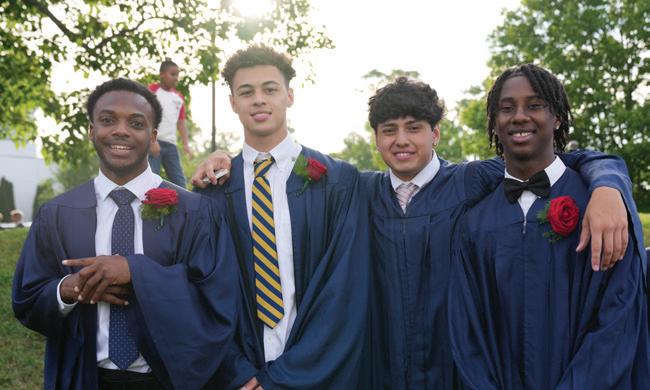
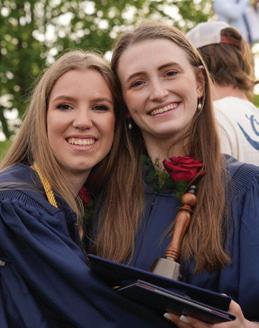

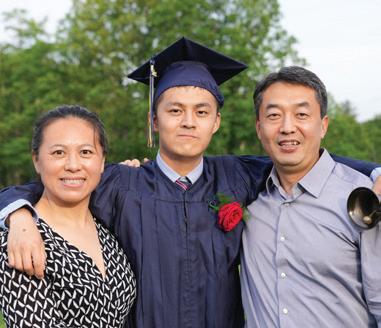
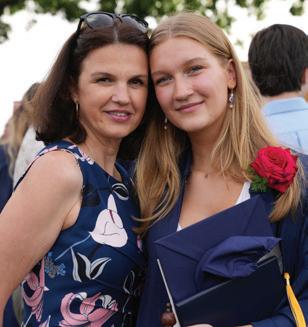
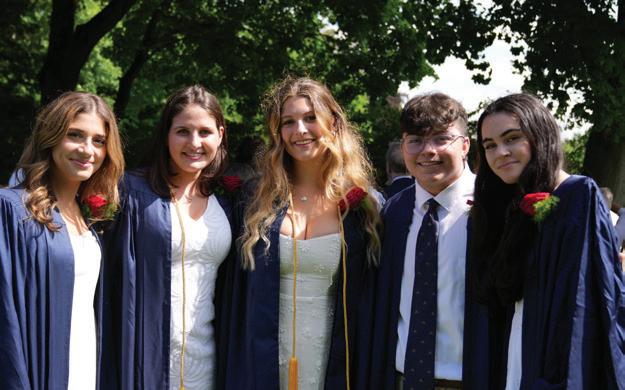
“You carry the virtues you have lived by during your time at King: Integrity, Kindness, Perseverance, and Respect,” Head of School Carol Maoz said as she addressed the graduates. “Those virtues have been our school’s guiding principles and will continue to serve as your life compass, guiding your decisions and helping you make the right decisions.”
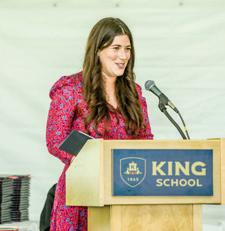
The class included 14 “lifers,” students who joined King in Prekindergarten, Kindergarten, or first grade. Two of them joined Maoz as speakers: valedictorian Ronald Harvey ’22 and senior speaker Jack Holtz ’22. Also sharing words of wisdom were Board Chair Thomas King P’20, ’20, ’23 and keynote speaker Julie Sheetz KLHT’03. The ceremony began with a blessing by the Rev. Mark Lingle from St. Francis Episcopal Church and a powerful rendition of “The Star-Spangled Banner" by Luisa Simon ’23.
A common theme among the speakers was the importance of a tight-knit and supportive community, especially in challenging times.
“As we celebrate your accomplishments and your special day,” Maoz said, “let’s also acknowledge the contributions of all those who have helped you get here — your friends and families, your teachers, coaches, administrators, and King School’s unwavering commitment to academic excellence.”
Jack delivered a side-splitting speech punctuated by his deep attachment to his classmates.
“The defining aspects of my time here were undoubtedly the friendships and connections that I have built along the way,” he said. “This definitely hasn’t been the easiest time to go through high school. However, I believe what kept us going during these tough times were the bonds that we share with one another.”
Those bonds were built on kindness, said Ronald, who considers this virtue the tie that binds the graduates.
Acknowledging the varied backgrounds, interests, and talents of his classmates, he pointed to collaboration and mutual respect as foundational to the class as a whole and credited this for his academic success.
“We don’t fit in a box as individuals or a group,” Ronald said.
“We have a wide variety of interests that make us each unique, and we don’t judge each other for being who we are.”
“As we leave school today for the last time, I want you to all recognize the value of community,” he told his classmates.
“This is what we have created and what we embody, and we should be very proud. As we go our separate ways after this summer, wherever the future takes you, remember how powerful a community like this one can be, and strive to create a community like ours in your new homes.”
Maoz echoed the message by highlighting the importance of multiple perspectives. “You have learned the power of teamwork and community, the importance of friendships, and diverse viewpoints and perspectives,” she said. “You know that together we are stronger.”
Resilience in unprecedented times was a central theme in Sheetz’s keynote address. As valedictorian of the Class of 2003, she graduated in the aftermath of 9/11 and understood the far-reaching effect that a historical event like a pandemic might have on the lives of the 2022 graduates.
–Ronald Harvey ’22
After her high school graduation, Sheetz was intent on bringing solutions and understanding to the world. Yet even with a clear plan, she took leaps of faith, and she encouraged students to be open to the unexpected.
After Sheetz earned a bachelor’s degree in international relations and French studies from the University of Pennsylvania, curiosity led her to Asia and eventually a master’s degree in Asian regional studies from Harvard University. Her career has taken her to the U.S. Department of Defense, where she is Chief of Staff for Indo-Pacific Security Affairs in the Office of the Secretary of Defense.
Sheetz encouraged the graduates to trust their instincts, be courageous in applying their knowledge, and test their theories.
“Take the job that’s uncomfortable, talk to the person who intimidates you — get outside your comfort zone,” she said.
“It is important to know your own limitations. And in testing them to find out that they might not be as limiting as you thought. Finally, you have to engage with the world around
you and be in dialogue with people and places that shape the context in which you will hone your own interests and pursue your ambitions.”
Tom King reminded students to pause and celebrate this milestone of academic achievement and to be confident that the work done thus far is a solid foundation for the future.
“As this stage of your life as a scholar comes to a close, a new chapter begins,” he said. “Your new challenge is to continue to stretch, to extend your abilities, to keep asking questions, exploring, and discovering. Never lose your sense of wonder, and I know you’ll change the world.”
In his closing words, Jack referred to Head of Upper School Marnie Sadloswky as a "contemporary philosopher." He quoted her in telling his fellow graduates to "dig deep and find a reason."
He added, “As I move on, my reason will be all of you.”
Maoz offered the graduates reassurance. “You are expanding your horizons and entering a different world, one that will be at times uncertain and unpredictable," she said. "We don’t know what the future holds, but I know you will be ready, ready to pursue your dreams, ready to succeed, and well prepared to better the world.”
“As we go our separate ways after this summer, wherever the future takes you…strive to create a community like ours in your new homes . ”

At King School, students and families engage in the college application process using their values, interests, and goals as foundational elements to identify colleges and universities that best fit their needs.
With a four-year developmental approach, the College Counseling Department empowers students to reflect on their abilities and ambitions in preparing for life beyond King. The collaboration among counselors, students, parents, teachers, and colleges helps students find the right match in higher education, as evidenced by the successes we celebrate together.
"The Class of 2022 graduated from King at a challenging time in the history of our nation and the world,” Director of College
Counseling Jessica Landis said. “The 50 outstanding colleges and universities that they have chosen to attend will call on them to think critically, debate, research, and innovate across a variety of disciplines."
Our students have done more than develop skills; they have become passionate learners and caring citizens. King graduates arrive at college confident and prepared. More important, they arrive courageous and ready to make an impact in their communities. Our matriculation list reflects an impressive and diverse range of colleges and universities that best fit the individual interests and goals of our students.
We are proud to share with you the broad list of colleges and universities that the members of the Class of 2022 attend:
American University (4)
Auburn University
Boston College (3)
Boston University
Brown University
Bucknell University (5)
California Polytechnic State University
Dartmouth College
Duke University
Elon University (3)
Fairleigh Dickinson University
Fordham University
Franklin and Marshall College
George Washington University (3)
Harvard University (2)
Indiana University (2)
Kent School (postgraduate year)
Lafayette College
Lehigh University
Loyola University New Orleans
Middlebury College (2)
Muhlenberg College
New York University (2)
Northeastern University (2)
Northumbria UniversityNewcastle Pennsylvania State University
Pitzer College Point Park University
Princeton University
Providence College
Rochester Institute of Technology
Savannah College of Art and Design
St. Lawrence University
St. Petersburg College
Suffolk University Syracuse University (3)
Texas Christian University Tulane University (4)
United States Military Academy
University of California-Irvine University of Colorado (2)
University of Connecticut University of Miami (9)
University of Michigan (3)
University of North Carolina University of Pennsylvania University of Richmond (3) University of Rochester (3)
University of St. Andrews University of Virginia Villanova University (3)
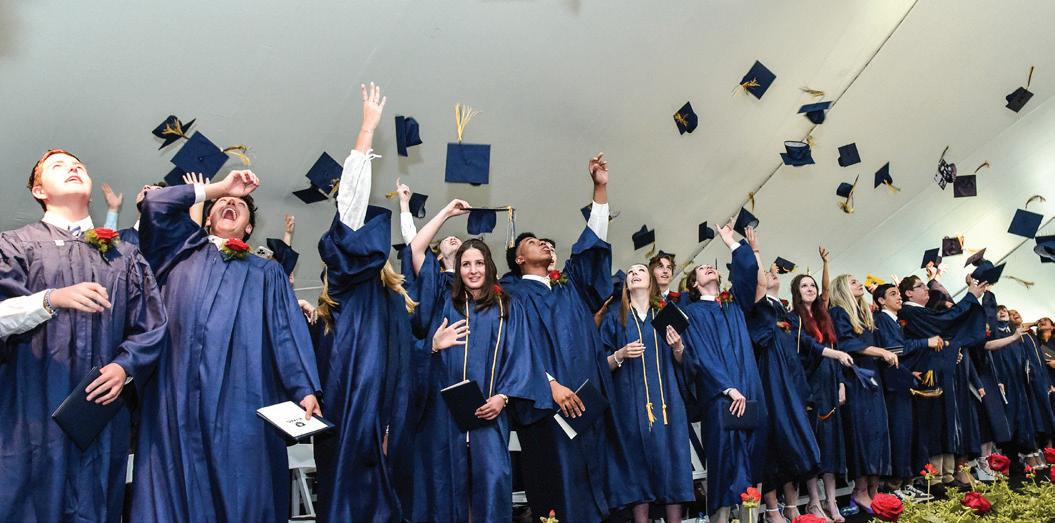
Congratulations to our 2018 graduates who left King armed with the virtues of Integrity, Kindness, Perseverance and Respect, and traveled far and wide to continue their academic pursuits. The degrees you earned this year will add to the tools you will take into the world as change agents for
good. We look forward to hearing about all the wonderful things that come in this new chapter and congratulate you on this graduation milestone. The future is bright with you leading the way. Go forth with confidence, and come visit when you can!
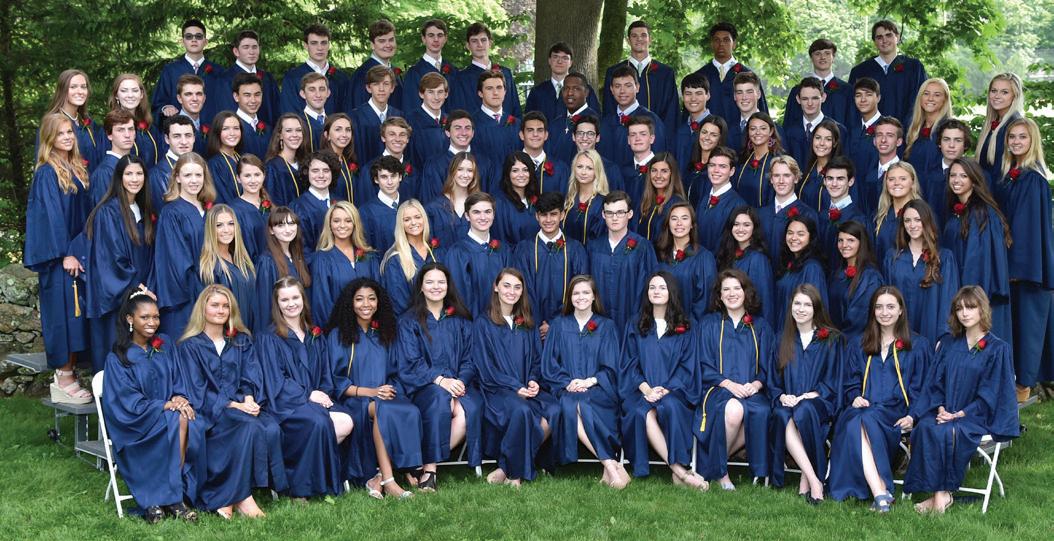
“Never lose your sense of wonder, and I know you’ll change the world ”
–Board Chair Tom King Address to the Class of ’22
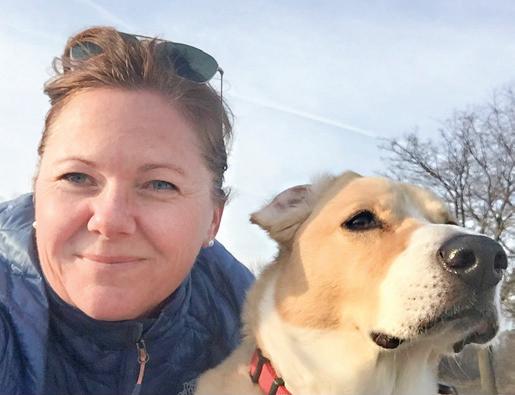
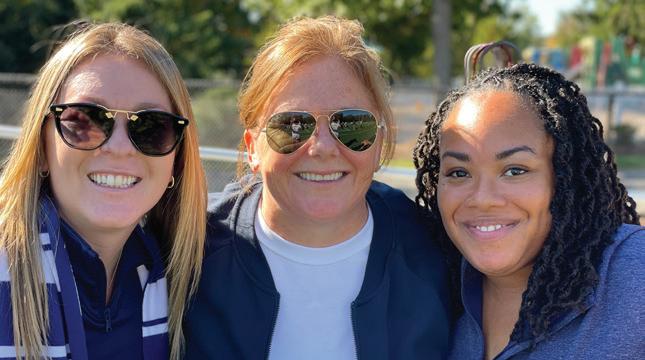
Early this year, King School welcomed Barb Drayer as Director of Development and Alumni Programs.
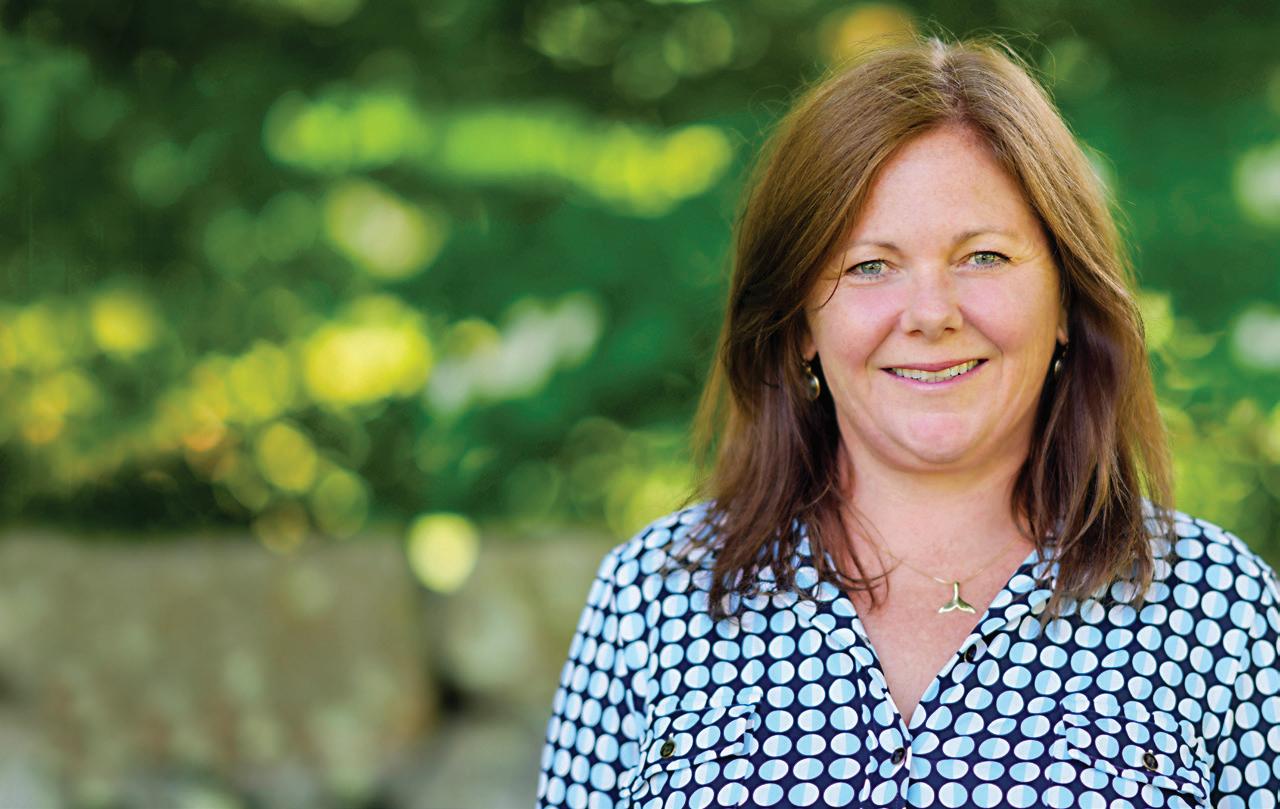
Drayer brings two decades of development experience in independent schools; most recently, she served as Director of Institutional Advancement at The Windward School in White Plains, New York. While at Windward, she supervised all engagement and fundraising efforts, including the annual fund and two ambitious capital campaigns. Drayer partnered with the board of trustees on strategic initiatives and led a team of seven employees on three campuses.
Prior to Windward, Drayer worked at The Dalton School in New York City as the school’s Director of the Annual Fund. In this role and among other responsibilities, she managed the largest annual fund in the school’s history, outlined all solicitation strategies, and worked closely with over 150 volunteers.
Drayer holds a master’s degree in administration from West Chester University in West Chester, Pennsylvania, and a Bachelor of Arts in political science from Hartwick College in Oneonta, New York.
Quest had an opportunity to speak to Drayer after her first eight months at King School
Why is fundraising so important for independent schools?
Every independent school relies on the annual fund to help balance the budget and to keep tuition low for all students, even those who are not receiving financial aid. Longer-term fundraising, such as capital campaigns, allows schools to improve their facilities and construct new buildings and adapt to the ever-changing needs of the students. Often in a capital campaign, funds are allocated to an endowment, which provides a certain percentage of funds to support the operating budget each year and helps keep costs as low as possible for parents.
How do you build and maintain engagement, and why is it essential to independent schools?
The Development Office staff is charged with building community across all constituencies of the school, but we do not work alone to accomplish that. Every aspect of the school experience, beginning with the first inquiry to the Admission Office, starts a relationship. The development team tries to build on that by offering volunteer opportunities, hosting social events, serving as points of contact, and creating a welcoming environment for parents, alumni, and grandparents to feel part of the King community.
What attracted you to King School? I’m going to answer this with the answer I hear most whenever I ask this question: the community! Last December, when I stepped onto the campus for my all-day interview, I was struck by the experience. This place radiates kindness. King’s commitment to teaching empathy to its students resonates. I think those virtues
are incredibly important in today’s world, and I wanted to work in a place that perpetuated such kindness.
What about your role do you like the most?
This is a tough question because there are so many parts. I enjoy working with the leadership team and Board. I have enjoyed getting to know parents and look forward to doing more of that this fall. I have really enjoyed building my team and seeing the five of them work so well together. And, of course, I love engaging in conversations with donors. In my first eight months, I have had some really lovely, interesting, and informative conversations about what interests them and what their hopes are for King.
What will your priorities be in your first year?
First and foremost, I would like to get the Annual Fund to a level of participation that is truly reflective of the passion I see in the King community. I am often told about how people love being part of King, but currently, the fund participation does not reflect that. I also look forward to getting to know the parents and the faculty better, as well as working with my team to get alumni engaged and re-engaged with King. We have some ideas that we’re excited to start implementing this year and look forward to higher community engagement.
What have you learned about the King community since your arrival?
The most obvious thing I have learned since my arrival is that people at King are truly committed to creating a warm and inviting community where everyone feels like they belong. They truly believe in the school’s virtues and want to create a safe place where students want to come each day and where they get the best education possible.
Anything you’d like to add?
I am just so excited to be here and hope I can add to the school’s success!
“This place radiates kindness . King’s commitment to teaching empathy to its students resonates . ”Drayer and her best friend, Bodie, a 9-year-old rescue. Barb Drayer, center, Director of Development and Alumni Programs, and colleagues Chelsea Morgan, left, Executive Assistant to the Head of School and Board Liaison, and Alana ClementeGlover, Associate Director of Development, at the 2022 Pep Rally.
The King School community gathered in April for the biennial gala, which serves as a fundraiser and a celebration of the school. This year’s event, “A Night Under the Stars,” was the first after an extended pause due to the COVID-19 pandemic, making it especially festive. The event was a huge success, thanks to a collaboration between the Parents' Association and the Development Office.
Over 350 guests enjoyed a night of mingling, dancing, dining, and giving. The event raised $550,000 through ticket sales, live and silent auctions, and individual donations. The gala’s proceeds are allocated to financial access, allowing more students to benefit from a King education.


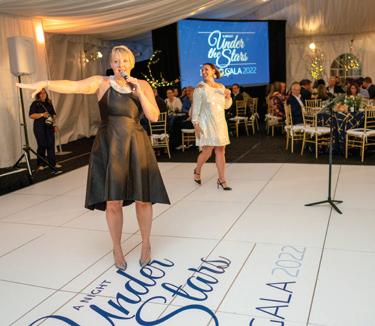
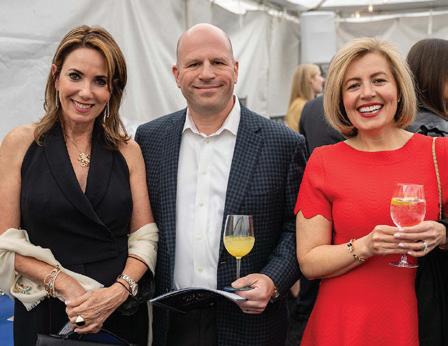


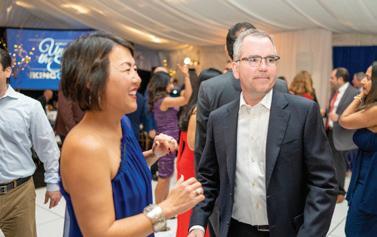








The entire community would like to thank the gala co-chairs, Kim and Richard Alexander P’21, ’22 and Minerva and Manuel Rodrigues P’23, ’25, ’26, ’29, and the volunteers who supported them, for their work in making the evening a success. We also congratulate the honorees Mary and Rob Holtz P’16, ’19, ’22 and the legacy award recipient Tom Conheeney P’15, ’15, ’18. Their dedication to King has made a tremendous impact on our community.
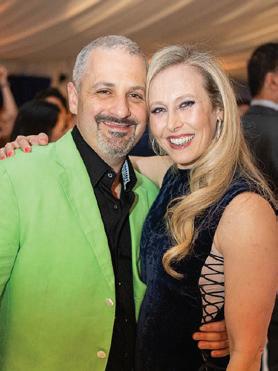
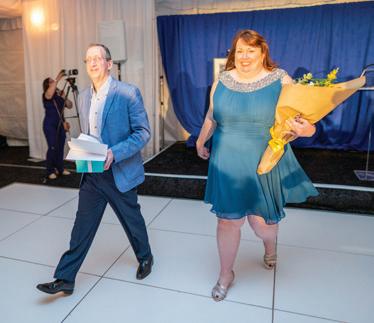
Thank you to all who attended and contributed to this fabulous evening.

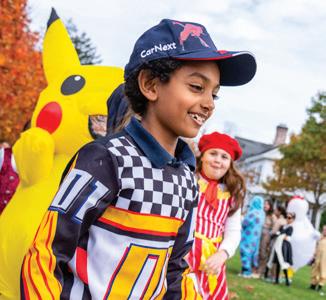
The success of King School comes from a community of people dedicated to realizing its mission. This network of relationships serves as the foundation for the school’s ability to thrive, and at every turn, we see the community in action at signature events and new occasions, too.





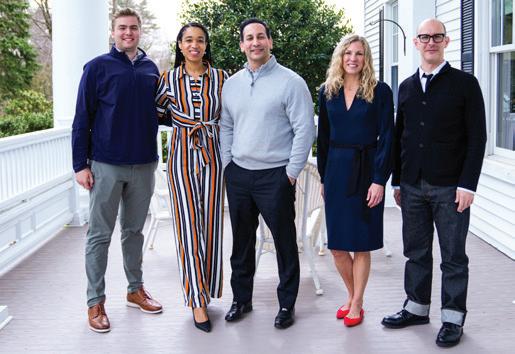



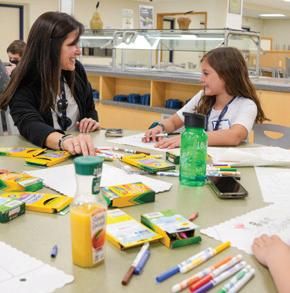




From DJ jams and grandparent visits to mentorships and career advice, the community is there ringing bells and celebrating progress. Here is a look at some of the events King hosted during the spring, summer, and fall 2022 seasons.



Thank you to all the members of our community who make our school a unique and special place to learn and grow.

The King School Parents’ Association (PA) is a reflection of the school’s rich and vibrant community. The association produces many programs for King that are steeped in the school’s mission and enrich the entire community. Through volunteerism and service, the PA facilitates communication between parents and the school at each grade level and supports various programs including Athletics, Art and Design, Performing Arts, and service. The PA is an integral part of our community and fosters a true King spirit within our families.
Thank you to the 2021-2022 Parents’ Association leadership and the tireless volunteers who make tremendous contributions to our community year in and year out.
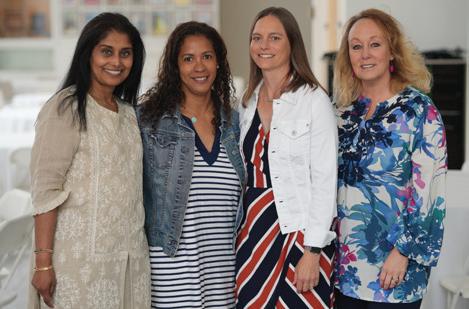
Sandy Burgoyne, President
Lindsay Oudsema, Executive VP
Minerva Rodrigues, Secretary
Mini Nunna, Past President
Jeff Leng, Treasurer
Althea Cooper, LS VP
Darunee Gambino, MS VP
Lisa Perlman, US VP

Jessica Lombardi, Prekindergarten
Rashida Morisset, Kindergarten
Lisa Mitchell, Grade 1
Monika Tello, Grade 2
Rachel Gigliotti, Grade 3
Chika Bedu-Addo, Grade 4
Darunee Gambino, Grade 5
Jaime Denatale, Grade 6
Jenny Mehta, Grade 7
Sue McKee, Grade 8
Kate Jennings, Grade 9
Kate Munno, Grade 10
Sarah Black, Grade 11
Christine Donnelly, Grade 12
Kim Alexander, Grade 12
Ilinca Creveling, Grade 12
KIND COMMITTEE
Mini Nunna
LOWER SCHOOL DJ JAM

God-is Rivera
LOWER SCHOOL/MIDDLE SCHOOL BOOK FAIR

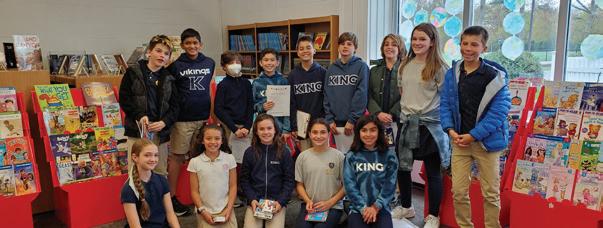
Bree Marsden
Dana Johnson-Chernet
PA FOOD DRIVE
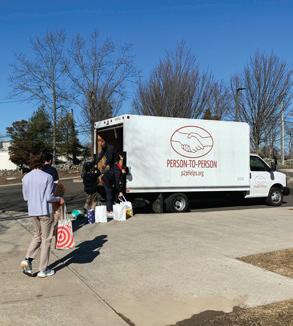
Tara Mitchell
Wendy Kleinman
Susan Owen
PA KING CARES— BUILDING 1 COMMUNITY

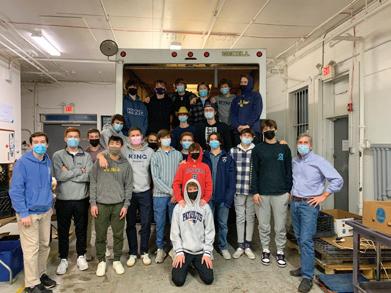


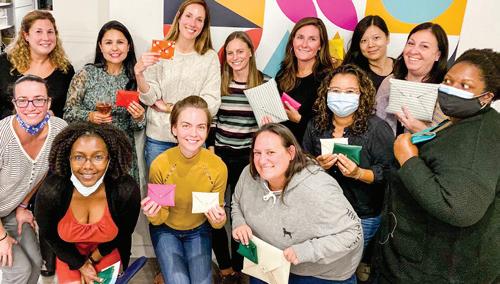

Kate Vivanco
Susan Leibowits
PA KING CARES—INSPIRICA
Lindsay Zaken
Kerry Fineberg
Deena Kur
PA MIDNIGHT RUN
Laura Iverson Kerry Fineberg



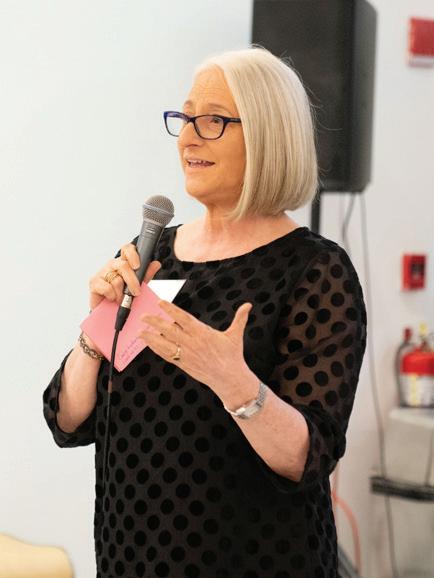





“We have our values, we have our people here, and we are strong . I am excited to be part of this . ” —Cathy Mishkin, Former Faculty
Viking pride was on full display on the King School campus as students, parents, faculty, staff, alumni, and friends of the school came together to celebrate Homecoming 2022.



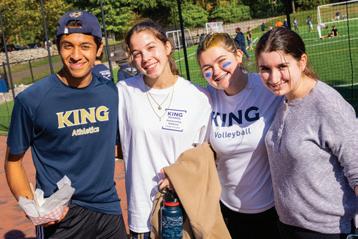
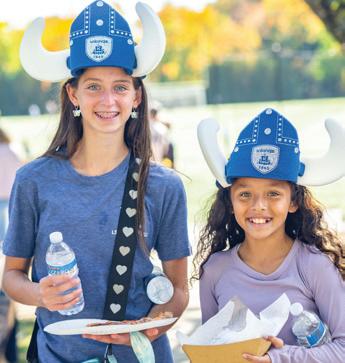
“Homecoming shows us the power of our community in full force,” Head of School Carol Maoz said.




“I love the energy at Homecoming,” Sydney Ryan ’24 said. “It’s electric!”
“How could we miss it?” said former Head of School Elizabeth “Sue” Cesare LH’48, P’78, ’81, GP’12, ’26. “It’s very nice to be here! It looks as wonderful as ever. The school has gotten stronger and stronger, and the culture is so unique!”
The annual event brings together the entire Viking community to celebrate the school’s rich history, enjoy athletic competitions and musical performances, and give back to the broader Stamford community. This year, the celebration kicked off on October 14 with a student pep rally on the Segalas Family Field.


Members of the upper school chorus opened with a spectacular performance of the national anthem. Students, faculty, and staff cheered for the upper school athletic teams as they ran across the field and high-fived. Each team and the Lower School Spirit Squad performed dance routines or cheers, and fueled school spirit with colorful outfits, pompoms, and banners.
This year’s “Viking” was Peter Passaro ’23, who said he felt honored to represent the school mascot in a full costume. “I was so excited,” he added. “This means so much to me!”
On Friday evening, 30 alumni from classes spanning 1972 to 2017 mingled during a cocktail reception at the Performing
Arts Center. They enjoyed reminiscing with their former teachers and classmates and meeting Maoz.
Saturday was a fun-packed day for King families that included a bake sale, giant inflatable slides and bounce houses, caricaturists, balloon artists, and a live DJ.
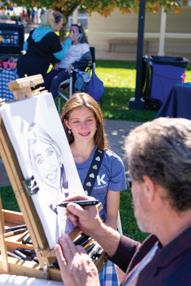
For Cordelia Beverly ’34, the best part of Homecoming was “going to the playground and meeting friends.” For her brother, Clyde David Beverly ’33, the best part was, hands down, “the bouncy house!”
Sandy Burgoyne P’27, president of the Parents’ Association, remembered the unfortunate but necessary disruptions caused by the COVID-19 pandemic in previous years. “All of our athletes are playing,” she said. “Our games are back. Our community is back in full force. It is the biggest true community event that we have, and the day could not be prettier.”
Food trucks provided something for everyone, and for those with a sweet tooth, the Parents’ Association bake sale was a must. “These bakers have really worked so hard to create such wonderful treats, some of them with King colors, King themes!” said Lauren Burke P’33, ’36, one of the two co-chairs of the bake sale. “The essence of the bake sale speaks to this community — just the happiness of being together.”
Seema Dohil P’25, ’27, ’28, ’28 volunteered in the School Store, which she co-chairs. The store was set up in a tent for the occasion. “You get to see people that you have not seen in so long, and reconnect,” she said. ”It’s really nice to reconnect with families.”
Alumni, teachers, and other members of the community gathered under a tent outside Simon House for a chance to reminisce while enjoying music and a delicious lunch.
David Elliott K’67 flew in from Newport Beach, California, to celebrate his 55th class reunion. “Being on campus, I recognize my old football field, the middle school, and the Simon building,” he said. “Other than that, this place has grown! It’s nice to see the development and it being coed. Who would have ever thought? In our day, the class was 27 boys!”
His classmate George Pappas K’67 came from Whately, Massachusetts. A nephew of King’s former Head of School Robert Kinsley Jackson P’62, ’66, Pappas pointed at Simon House, and the memories flowed. “I actually lived in that house!,” he said. “I did grow up here. It really is a homecoming, and it is great to see my classmates.”
Jackson’s son, Dick Jackson K’66, was also in attendance. His classmate Harry Kast K’66 flew in from Bermuda.
Former faculty Cathy Mishkin came to the alumni tent, where she reunited with several of her former students and colleagues, including Cesare and Karin Wagner P’90, ’93. Mishkin’s tenure spanned Low-Heywood, Low-Heywood Thomas, King & Low-Heywood Thomas, and King School from 1976 to 2019.
“I am just thrilled to see so many people and so many of the things that were here when I was here,” she said. “Of course, there are also many more new things. We have our values, we have our people here, and we are strong. I am excited to be part of this.”
Sitting at a table with her parents was Middle School Counselor and DEIB Coordinator Jennifer Guevara KLHT ’97, P’24, ’28, ’30, ’30. Her mother, Deborah Roselle P’94, ’97, ’00, GP’24, ’28, ’30, ’30, remembered her long-lasting connection to the school. “We go back to the ’80s,” Roselle said as she listed all of her children and grandchildren who have attended either King or its founding schools. (Her son-in-law, Anthony Guevara KLHT ’93, is another alumnus.) “We have seen a lot of changes, but the essence remains the same. The school is
“I have been a registered nurse for over 35 years,” she said. “I am newly promoted to Director of Advocacy for Women’s Oncology. This is my foundation. I know I would not have been able to do this without this school. This is the quality [of education] that we had in the 1980s, and I have no doubt that that has continued.” great. The education they all got was great. They all excelled. It’s a great feeling.”
After lunch, alumni had an opportunity to tour the campus. Memories came flooding back to Kate Nichols KLHT’02 as she walked the halls of the Lower School. “This is where I grew up," she said.

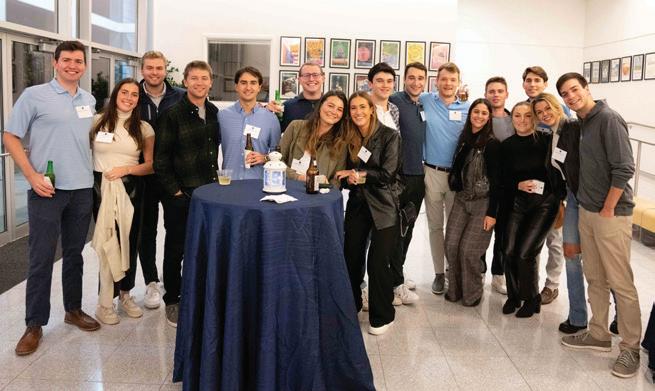
Nichols continued to explore the campus and its changes, pausing at one point to pose for pictures in front of the Upper School’s Connie Nichols Art Studio, named for her mother, who taught art at the school for 38 years before retiring in 2019.
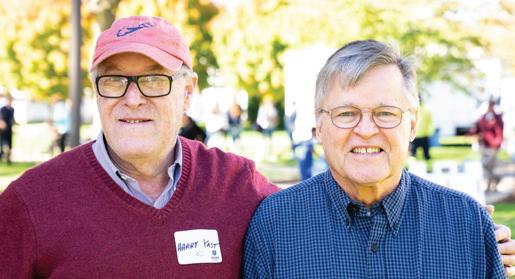

She was thrilled to see the painting she created as part of her senior art project still hanging in the upper school stairwell. She was impressed by the improvements to the building, and though the school looked different and new, she said she appreciated that the work of past students remains.
The upper school jazz and rock combo band and the middle school band performed at Homecoming festivities. The talented young musicians were led by music teacher and Performing Arts Chair Garrett Mendez.
“It’s amazing what they can do!” Elliott said.
Enrique “Ricky” Arango ’28 played the saxophone outside the alumni tent. “To be playing at Homecoming, it’s just such an honor,” he said, “Playing for the team we love, playing for the team that some of us will be playing on, it’s just fun!”
This was the 18th Homecoming for World Languages faculty member and Grade 11 Dean Margherita Farrell. “Always awesome!” she said. “I always love seeing my advisees who come back every year and who are now fully blossomed and grown! I also love seeing all my kids from classrooms in the fields doing their thing!”
The campus was bustling with activities and athletic competitions. King athletes gave it their all and took home several hard-fought wins.
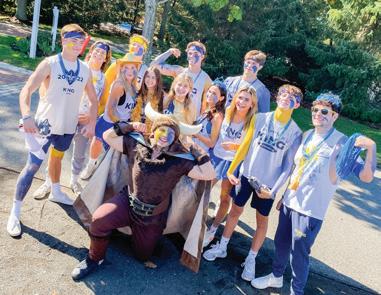

“We were excited to showcase our community with 11 of our fall teams and athletes in action on a beautiful Saturday afternoon, and it was a great day for everybody,” Dean of Athletics Micah Hauben said.
On Sunday morning, the 10th annual King Cares 5K concluded Homecoming weekend with the biggest turnout yet. With runners, volunteers, and sideline cheerleaders, nearly 200 community members participated. By the end of the day, the event had raised close to $14,000, and donations were still rolling in. The proceeds will go to the Boys & Girls Club of Stamford and the Orphaned Starfish Foundation. A big thank you to all who took part in this event.
King School is very grateful to the Parents’ Association members for all their dedication, time, and effort to make Homecoming 2022 a tremendous success. Their projects included managing the School Store, coaching the Spirit Squad, and baking and selling delicious treats. Kudos to the King School staff who helped organize this community event.
Arnita “Nene” Roberts Christie LHT’82 swapped her nursing scrubs for a varsity jacket from her time as a cheerleader at Low-Heywood Thomas to attend King School’s Homecoming and celebrate her 40th class reunion. She also carried the hunter green senior blazer she wore as a student.
“It’s really nice to come back and reunite, see all the improvements and extensions of the school, and remember and give thanks to all the wonderful, dedicated, inspiring and encouraging, and loving teachers,” she said.
As she toured the Academic Center in the Upper School led by Director of Marketing Lakeya Graves, Roberts Christie came across a picture of cheerleaders from the 1980s and she recognized herself in it.

“This photo captures the diversity of the school in the ’80s, and I was a part of it,” she said of the image. “To be here 40 years later and to see the diversity. I look at the young lady that toured us around, and she is Black like me. This is a good thing, and I am glad to still be affiliated with this school.”
Among her fondest memories as a student was the continual encouragement she says she received from the late Priscilla Pusack, a biology and chemistry teacher for 44 years at King & Low-Heywood Thomas School.
“I would not have gone to nursing school if I couldn’t pass biology,” Roberts Christie said of Pusack’s course. “I came in my sophomore year. This school was hard. And I said, ’I can’t do this.’ And she said: ’You will do this. I will stay after school with you.’ And she stayed with me. I passed biology with a B!”
After graduating from Low-Heywood Thomas, Roberts Christie pursued a nursing degree from Widener University and eventually earned a master’s degree in human resource development and counseling from the University of Bridgeport. She now works as a Global Patient Engagement Liaison for GSK, a British multinational pharmaceutical and biotechnology company.
Barbara turned 100 this year, and her family marked the occasion with a once-in-a-century shindig. The party was hosted by her son, and the space could hardly contain the guests who tested the capacity of three rooms. She was thrilled to celebrate the occasion with her four children, six grandchildren and two great-grandchildren.
Leslie is living in Ann Arbor, Michigan, about midway between two of her children, who live on opposite coasts. Her third is continually on the move, making it hard to keep up. She has three grandchildren; the oldest is 13. Leslie recently stopped playing tennis but is still lobbing balls in platform tennis, and is looking forward to jumping on the pickleball trend soon. She shares fond memories of Low-Heywood School, especially the influence Ms. Horne had on her, and the days of filching food and ginger ale from the kitchen with her friends.

Carol shares poetic memories of the Thomas School and its Rowayton campus, where the sun cascaded through the classroom windows as Miss Wallace brought world history to life while leading class in her tidy tweed suits and sturdy, sensible shoes. Mythology adventures took vivid form under the guidance of Dr. Franckenstein in Latin and Greek classes. The elegant Kay Boyle taught creative writing in style, with shell earrings that elevated her perfectly styled white hair. And French teacher Madame Froelicher was “kindness and grace.”



Rick spent 17 days in May in Angkor, Cambodia, where the quiet was awesome. "No one was there,” he said. “It was incredible. The hotel manager told me there were 100 tourists in the whole city. Angkor Wat typically sees 20,000 people per day. I was inspired to go by my childhood hero, Richard Halliburton and his ’Book of Marvels.’”

One of Rick’s favorite King memories is telling his history teacher Mr. Coyle about a summer trip to his aunt's home, where he met Alexander Kerensky, who served as president of Russia in 1917. Coyle had crossed paths with the former president while in college. Rick and Mr. Coyle had a great time sharing stories about their interactions with the leader, who Rick described as a very short, energetic man with a crew cut.

After a 35-year career as an orthopedic surgeon in Boston, David retired in 2020. He and his wife, Debbie, are enjoying their children and grandchildren, who live near their home in Orleans on Cape Cod. He has fond memories of his days at King and wonders how the time has passed so quickly. David enjoys his memories of the senior room in the garage, listening to the Mills Brothers on the record player, Kurt Carlson’s VW, and Bob Tackman’s Jag.
Robert is married, ordained, and has three kids, the oldest, Tom the Elder, is now 40. Robert served five local parishes in three states during his 35-year career, and eased into retirement last January after two interim ministries. His wife is teaching kindergarten in Springfield, Massachusetts, and Robert is enjoying retirement with kayaking, fishing, playing bass in a band, growing hops, brewing beer, working on the replica 1965 Shelby Cobra in the garage, gardening, and trying not to bump into bears, bobcats, deer, and the other wildlife that cruise through his backyard. He sends his best to all of his classmates.
Ed is continuing his consulting work in governance to .com and .org clients. He was recently named Entrepreneur in Residence for the BlueSwell Incubator, which supports startups that enhance ocean health. BlueSwell is part of SeaAhead, a corporation that calls itself the “venture ecosystem the ocean’s been waiting for,” making it a natural fit for Ed, who is a top-tier sailor. He is sailing quite a bit and competing at a very high level.

This year, Valerie is celebrating the release of her second and third books: “Together We Ride,” which was released in April, and “Ride, Roll, Run: Time for Fun,’’ which was released in October. The sequels will be released in 2023. Valerie has received several awards, including the Margins Rishi Award, the National Education Association’s H. Councill Trenholm Memorial Award; the Connecticut Education Association’s Susan B. Anthony/Prudence Crandall Equality Award; and the State Education Resource Center’s George A. Coleman Excellence in Equity Award.

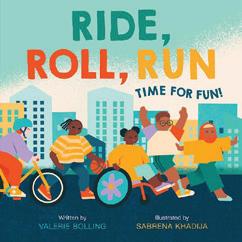
Buzz found retirement boring, so he bought the Arlington Inn & Spa and is going back to work. The inn, which is in the southern Vermont town of Arlington, was an estate built in 1848 and is now a bed and breakfast made up of four buildings on four acres.
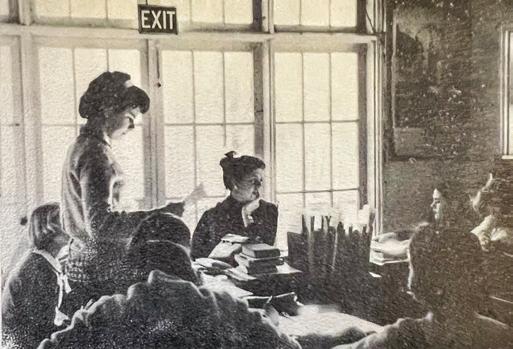

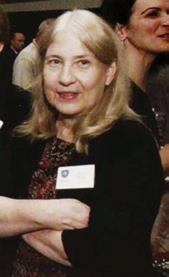

Ann hosted a five-kilometer run and one-mile walk fundraising event in Rowayton in memory of her husband, Tilden Ham Bunge, who died of melanoma in 2020. Participants wore silly hats to go with the theme, “Hats On for Hammy,” and danced to live music after the run. The proceeds benefited AIM at Melanoma Foundation. Ann sends her appreciation for the fond memories of her time at Low-Heywood Thomas, especially for her education and friendships.

Zandra has been promoted to senior vice president and chief accounting officer at Beam Living, a New York-based real estate management company. She also co-founded the Beam Women’s League to advance the career development of female professionals.
Colin and his wife, Julia, are expecting their first child in April. He has finished his fifth season as a public-address announcer for the New York Mets.
Lauren and her husband, Chad, welcomed baby Charlie on April 22. Charlie is the third Bellmare baby. He was greeted on arrival by his big sisters Cece ’33 and Lydia ’36.
Amanda and Scott welcomed Devyn Rose Schimmel to the world on January 10. Devyn is the second child for Amanda and Scott, and her arrival is a thrill for her big sister, Scarlett Fire.
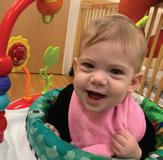
Marlon married Grace Mashore on October 1 in Grace's hometown, Washington, D.C. Marlon proposed to Grace on their Manhattan rooftop overlooking Central Park and, when she said “yes,” they continued their celebrations at their favorite jazz bar in Harlem. They were married at the historic National City Christian Church and danced the night away at Cosmos Club, where the reception was held. Marlon and Grace were joined at their wedding by a handful of King alumni and their partners, some of whom were cherished members of their bridal party.
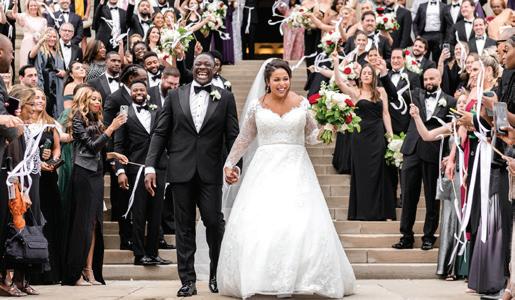
Pamela
July 16, 1952–September 18, 2021


August 30, 1948–October 12, 2022
Frederick G. Richards III K’65 December 14, 1946–






Maurice
KISHAUNA SOLJOUR, PH.D.
Kishauna has joined the Department of Classics and Humanities at San Diego State University as an assistant professor.
After a career working on private and corporate aircraft, Nick is gliding across the water as a rowing coach for middle and high school athletes at a school in Fairfield County.
John
Paul
Domenick
Longtime King Low-Heywood Thomas biology and chemistry teacher Priscilla Swanson Pusack passed away October 12. She was 74.

Pusack was a visionary. Long before people were talking about the environment, she was teaching her students to be conscious of how their choices would impact the planet. She took students into the woods to explore nature, cultivating Mother Nature’s future caregivers. Her love and passion for science inspired many of King’s graduates to pursue degrees and professions in the field. And more than career paths, she shared creative confections: For 45 years her advisees indulged in her magical seven-layer bars.
When she first came to the school, she was Priscilla Swanson. She met and married math teacher Bill Pusack during her time at KLHT. Together, they dedicated 82 years to Thomas, LHT, KLHT, and King. They had two children who graduated from the school, Timothy KLHT’01 and Anna Pusack Allen KLHT’06, who is married to Khaled Allen KLHT ’05.
— Cathy Mishkin
King School celebrates the community members who have dedicated decades of their lives to helping realize the mission of the school. These members of our faculty and staff have lived the King virtues and kept the most important part of the school in mind: the students.



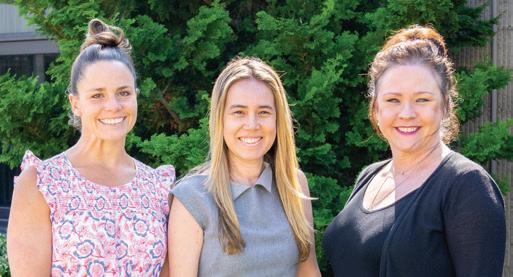
The King family recognizes these mainstays. Thank you for helping the school reach its long-term goals and for the care and guidance you have given to generations of students who have benefited from your service.

King School 1450 Newfield Ave Stamford, CT 06905 (203) 322-3496 kingschoolct.org
